
121+ Scientific Research Topics for High School Students

High school is a time of exploration, and for budding scientists, it’s the perfect opportunity to dive into the exciting world of scientific research. Whether you’re passionate about biology, chemistry, physics, or the social sciences, there’s a wealth of fascinating topics waiting to be explored.
In this blog, we’ve compiled over engaging scientific research topics for high school students. These topics not only ignite your curiosity but also align with your academic journey. From unraveling the mysteries of genetics to exploring the cosmos, we’ve got you covered. So, let’s embark on this thrilling adventure of discovery and learning together!
What is a Scientific Research Topic?
Table of Contents
A scientific research topic is a specific subject or question that scientists or researchers investigate through a structured and systematic approach. These topics can cover a wide range of fields, from biology and chemistry to physics and social sciences. The goal of selecting a research topic is to address a problem, explore a hypothesis, or contribute new insights to an existing body of knowledge.
Why Engage in Scientific Research as a High School Student?
High school is the perfect time to start exploring scientific research because it:
- Fosters curiosity and a love for learning.
- Enhances problem-solving and critical thinking skills.
- Offers a taste of what a future career in science might entail.
- Provides an edge in college applications.
How to Choose the Right Scientific Research Topics for High School Students?
Selecting a research topic can be challenging, but it’s essential to choose something that genuinely interests you. When choosing a scientific research topic, it’s essential to consider the following factors:
- Interest: Select a topic that genuinely interests you. Your enthusiasm will drive your research forward.
- Relevance: Ensure that your topic is relevant to the field you’re studying or the scientific discipline you’re interested in.
- Feasibility: Assess whether you have access to the necessary resources and equipment to conduct research on your chosen topic.
- Ethical Considerations: Make sure your research is conducted ethically and follows all relevant guidelines and regulations.
Interesting Scientific Research Topics for High School Students
Now, let’s dive into the exciting world of scientific research topics for high school students in different categories:
Biology Research Topics
Let’s explore the scientific research topics for students in biology:
1. The impact of different types of diets on human health.
2. Investigating the effects of climate change on local ecosystems.
3. Studying the genetics of a specific inherited disease.
4. Exploring the biodiversity of a local habitat.
5. Investigating the role of microorganisms in soil health.
6. Analyzing the effects of pollution on aquatic life.
7. Studying the behavior of a specific animal species.
8. Investigating the impact of a new drug on cell growth.
9. Exploring the relationship between exercise and heart health.
10. Studying the effects of various fertilizers on plant growth.
11. Investigating the genetics of taste perception.
12. Exploring the impact of environmental factors on plant adaptation.
Chemistry Research Topics
Here are some scientific research topics for high school students in chemistry:
1. Investigating the properties of different types of polymers.
2. Studying the effects of pH on chemical reactions.
3. Analyzing the composition of a local water source.
4. Exploring the chemistry of food preservation methods.
5. Investigating the synthesis of a specific chemical compound.
6. Studying the effects of temperature on reaction rates.
7. Analyzing the chemical components of household products.
8. Investigating the properties of nanomaterials.
9. Exploring the chemistry of natural dyes.
10. Studying the chemical reactions involved in baking.
11. Investigating the chemistry of fireworks.
12. Analyzing the composition of air pollutants in your area.
Physics Research Topics
Let’s dive into the physics research topics for high school students:
1. Investigating the laws of motion using simple experiments.
2. Studying the behavior of light using prisms and lenses.
3. Analyzing the effects of different materials on magnetic fields.
4. Exploring the properties of waves and sound.
5. Investigating the relationship between temperature and electrical conductivity.
6. Studying the principles of electromagnetism.
7. Analyzing the motion of objects in a vacuum.
8. Investigating the behavior of pendulums.
9. Exploring the properties of different types of mirrors.
10. Studying the physics of roller coasters.
11. Investigating the properties of superconductors.
12. Analyzing the behavior of particles in nuclear reactions.
Environmental Science Research Topics
Discover some scientific research topics for high school students in environmental:
1. Studying the impact of deforestation on local climate.
2. Investigating the effects of pollution on aquatic ecosystems.
3. Analyzing the biodiversity of a local wetland area.
4. Exploring the use of renewable energy sources in your community.
5. Investigating the impact of plastic waste on marine life.
6. Studying the effects of urbanization on local wildlife.
7. Analyzing the water quality in a nearby river.
8. Investigating the effectiveness of different recycling methods.
9. Exploring the impact of climate change on bird migration patterns.
10. Studying the use of sustainable agriculture practices.
11. Investigating the effects of air pollution on respiratory health.
12. Analyzing the benefits of green roofs in urban areas.
Social Science Research Topics
Here are some social science research topics for high school students:
1. Investigating the impact of social media on mental health.
2. Studying the effects of peer pressure on academic performance.
3. Analyzing the relationship between family dynamics and child development.
4. Exploring the influence of music on mood and behavior.
5. Investigating the effects of bullying on adolescent well-being.
6. Studying the role of gender stereotypes in career choices.
7. Analyzing the impact of video games on cognitive skills.
8. Investigate the factors influencing voter turnout in your community.
9. Exploring the effects of income inequality on social mobility.
10. Studying the relationship between parental involvement and student success.
11. Investigating the influence of advertising on consumer behavior.
12. Analyzing the impact of cultural diversity on community cohesion.
Astronomy Research Topics
Let’s explore the scientific research topics for high school students in astronomy:
1. Studying the phases of the moon and their impact on tides.
2. Investigating the properties of asteroids and comets.
3. Analyzing the life cycle of stars.
4. Exploring the potential for life on other planets.
5. Investigating the effects of light pollution on stargazing.
6. Studying the orbits of planets in our solar system.
7 Analyzing the properties of black holes.
8. Investigating the formation of galaxies.
9. Exploring the search for extraterrestrial intelligence (SETI).
10. Studying the impact of solar flares on Earth’s magnetic field.
11. Investigating the history of space exploration.
12. Analyzing the concept of time dilation in relativity.
Psychology Research Topics
Discover the psychology research topics for students:
1. Investigating the effects of mindfulness meditation on stress reduction.
2. Studying the impact of early childhood experiences on adult behavior.
3. Analyzing the relationship between sleep patterns and mood.
4. Exploring the psychology of decision-making under uncertainty.
5. Investigating the effects of music therapy on patients with Alzheimer’s disease.
6. Studying the role of empathy in interpersonal relationships.
7. Analyzing the psychology of fear and phobias.
8. Investigating the effects of social isolation on mental health.
9. Exploring the influence of advertising on consumer behavior.
10. Studying the psychology of memory and recall.
11. Investigating the relationship between personality traits and career choices.
12. Analyzing the effects of social media on self-esteem.
Earth Science Research Topics
Here are some scientific research topics for high school students in earth science:
1. Studying the formation of earthquakes and their impact on landscapes.
2. Investigating the processes of erosion and sedimentation in rivers.
3. Analyzing the effects of climate change on glacial retreat.
4. Exploring the formation of volcanoes and their eruptions.
5. Investigating the geology of a specific region.
6. Studying the impact of tsunamis on coastal communities.
7. Analyzing the properties of different types of rocks and minerals.
8. Investigating the formation of caves and underground formations.
9. Exploring the processes of weathering and soil formation.
10. Investigating the geological history of a particular mountain range.
11. Studying the impact of wildfires on ecosystems and soil.
12. Analyzing the effects of climate change on the availability of freshwater resources.
Engineering and Technology Research Topics
Let’s dive into the engineering and technology research topics for high school students:
1. Investigating the efficiency of solar panels in different weather conditions.
2. Studying the aerodynamics of different wing designs in model airplanes.
3. Analyzing the impact of 3D printing on manufacturing processes.
4. Exploring the development of sustainable building materials.
5. Investigating the use of artificial intelligence in autonomous vehicles.
6. Studying the effectiveness of water purification methods.
7. Analyzing the design and performance of wind turbines.
8. Investigating the development of wearable health monitoring devices.
9. Exploring the use of drones for environmental monitoring.
10. Studying the impact of cybersecurity threats on modern technology.
11. Investigating the design and efficiency of energy-efficient homes.
12. Analyzing the potential of blockchain technology in various industries.
13. Investigating the impact of 5G technology on wireless communication networks.
Health and Medicine Research Topics
Discover the scientific research topics for high school students in health and medicine:
1. Investigating the effects of different types of exercise on physical fitness.
2. Studying the impact of nutrition on weight management.
3. Analyzing the relationship between sleep patterns and overall health.
4. Exploring the effectiveness of alternative medicine treatments.
5. Investigating the genetics of a specific medical condition.
6. Studying the effects of stress on the immune system.
7. Analyzing the impact of vaccinations on public health.
8. Investigating the use of telemedicine in healthcare delivery.
9. Exploring the factors influencing antibiotic resistance.
10. Studying the psychology of pain perception.
11. Investigating the effects of environmental pollutants on human health.
12. Analyzing the relationship between diet and chronic diseases.
13. Studying the potential benefits of gene therapy in treating genetic diseases.
Mathematics and Computer Science Research Topics
Let’s explore the mathematics and computer research topics for high school students:
1. Investigating the properties of prime numbers and their applications.
2. Studying the algorithms used in data encryption.
3. Analyzing the efficiency of sorting algorithms.
4. Exploring the applications of artificial intelligence in image recognition.
5. Investigating the mathematics of fractals and their visual representations.
6. Studying the use of data mining in predicting consumer behavior.
7. Analyzing the algorithms used in recommendation systems.
8. Investigating the mathematics of network theory.
9. Exploring the applications of game theory in decision-making.
10. Studying the mathematics behind cryptography.
11. Investigating the use of machine learning in natural language processing.
12. Analyzing the algorithms used in optimizing transportation routes.
13. Analyzing the applications of quantum computing in solving complex problems.
Tips for Conducting Scientific Research Topics for High School Students
Before you embark on your research journey, consider these tips:
- Define clear research objectives.
- Seek guidance from teachers or mentors.
- Maintain organized records of your work.
- Stay persistent and embrace failure as a learning opportunity.
Engaging in scientific research topics for high school students can be an incredibly rewarding experience. It allows you to explore your interests, develop critical skills, and contribute to our collective understanding of the world. When selecting a research topic, remember to choose something that genuinely excites you, is relevant to your field of interest, and is feasible given your available resources.
Whether you’re passionate about biology , chemistry, physics, social sciences, or any other field, there’s a fascinating research topic waiting for you to explore. So, roll up your sleeves, ask questions, and embark on your scientific research journey—it’s an adventure that can shape your future and the world around you.
Related Posts
8 easiest programming language to learn for beginners.
There are so many programming languages you can learn. But if you’re looking to start with something easier. We bring to you a list of…
10 Online Tutoring Help Benefits
Do you need a computer science assignment help? Get the best quality assignment help from computer science tutors at affordable prices. They always presented to help…
Final Summer I 2024 Application Deadline is June 2, 2024.
Click here to apply.

Featured Posts

10 Reasons Why You Should Apply to APA’s Internship for High School Students

Stanford STaRS Internship Program - Is It Worth It?

How to Show Demonstrated Interest - 8 Tips for College Admissions

10 Free Summer Math Programs for High School Students

10 Online Summer Camps for Middle School Students

6 Entrepreneurship Internships that You Should Check out as a High School Student

10 Free Biology Summer Programs for High School Students

10 Free Programs for High School Students in California

NASA's High School Aerospace Scholars - 7 Reasons Why You Should Apply

10 Film Internships for High School Students
25+ Best Science Research Ideas for High School Students
If you’re an ambitious high school student looking for opportunities to build your college profile and learn new skills, consider undertaking a research project. You do not need to be sure about what you want to major in, but having a general idea aligned with your interests helps! Conducting research shows demonstrated interest in a subject, aids critical thinking and problem-solving, provides laboratory experience, and helps you gain analytical and communication skills.
What makes a good research idea?
There are a few key components you need to keep in mind when thinking about a research topic:
What is your project trying to achieve? For your research to be relevant, it needs to identify a knowledge gap and be significant. Your research findings should add to existing literature and help future researchers.
It is important to state what will be included in your research explicitly. Clearly defined boundaries help estimate a realistic timeline and allocate any necessary resources.
The easiest way to be dedicated throughout your research project is by choosing a topic you are passionate about! This will make sure you remain motivated throughout, and it will reflect in your work. Do not choose a topic for the sake of it — you will find the project difficult to complete and your disinterest will reflect in the quality of your work.
Feasibility:
You may have a grand idea for your research topic, but can you execute it? It’s important to consider any constraints you may have — time, money, etc. — and choose a topic that can be completed with your given resources. If you are working independently, choose a topic that isn't resource-intensive. For example, research that requires you use advanced telescopes to examine cosmological patterns may not be feasible if you do not already have access to one.
What do I do once I have a research idea?
Great job, you have found a topic that interests you, is relevant to the field, and is feasible in scope and resources! Next step, you need to find a mentor who can guide and advise you through the research process. They could be a working researcher, a college professor, a graduate student, or a Ph.D. candidate.
If you’re looking for a mentor, we’d recommend applying to the Lumiere Research Scholar Program which connects students with world-class researchers, offers one-on-one mentorship, and guides you through the research and writing process, even helping you get your paper published!
Chemistry research ideas for high school students:
Chemistry can be a great field to undertake independent research in — chemical reactions form the basis of life and can give you a deeper understanding of the world. Moreover, chemistry is directly related to important issues that affect us, like climate change, drug discovery, nanotechnology, and more. Research in these domains can lead to life-changing benefits for society!
Some topics you can research include:
1. Using green chemistry to achieve sustainability targets in the fields of energy, water remediation, agriculture, and sensing
2. Analyzing different energy storage options and comparing and contrasting different technologies' chemistries, performance, lifetime, cost, geographic and resource constraints, and more
3. Investigating how startups and the private sector’s newest technologies are critical to the transition to a green future and how products are commercialized from lab to market
4. Understanding how material nano-structure can create specific properties and take advantage of "structure-property" understanding to engineer new materials
5. Determining the role small molecules play in imaging, labeling, target identification, inhibiting native protein functions, and facilitating foreign ones, especially in new techniques used to understand disease pathways
6. Investigating how molecules are made in nature, such as the reactions performed by enzymes to make natural products
Suggested by Lumiere PhD mentors at Harvard University, University of California, Berkeley, Yale University, University of Cambridge, Technical University of Munich, Georgia Institute of Technology, Duke University, University of Leeds, Cornell University, and John Hopkins University
Biology research ideas for high school students:
Research in biology can contribute to humans’ understanding of living organisms, lead to medical breakthroughs and advancements in healthcare, contribute to cancer research and treatment, deepen our understanding of genetics, improve sustainability by helping develop biofuels and biodegradable materials, and more.
7. Tumor progression and how cancer cells invade and interact with other cells
8. Cancer immunotherapy: the study of how cancer cells evade the immune system and how we can harness the immune system to battle cancer
9. Researching past and current technologies used in gene editing. Identify challenges and weigh the ethical and social implications of these technologies
10. Identifying technical challenges in mass vaccination campaigns. Review existing data from public health organizations and current scientific literature on new vaccine delivery technologies
11. Analyzing the effects of alcohol and drug addiction on the brain
12. Discovering different theories of learning and memory. You can design and use different clinical studies here
Suggested by Lumiere Ph.D. mentors at Stanford University, UC Berkeley, Cornell University, Duke University, and Yale University
Physics research ideas for high school students:
Have space, quantum physics, nuclear science, and other such subjects always fascinated you? If so, a research project in physics is a great way to dig deeper and understand why different phenomena occur. Physics is a broad and interconnected discipline; research in the subject can cover topics like mechanical and electrical engineering, quantum computing, nuclear energy, astrophysical and cosmological phenomena, and computational technologies.
13. The features and limitations of augmented and virtual reality technologies, current industry standards of performance, and solutions to address challenges
14. Cosmological mysteries (like dark energy, inflation, and dark matter) and their hypothesized explanations
15. Physical processes that shape galaxies through cosmic time in the context of extragalactic astronomy and the current issues and frontiers in galaxy evolution
16. Radiation or radiation measurement in applications of nuclear physics (such as reactors, nuclear batteries, and sensors/detectors)
17. The electrical and thermodynamic properties of Boson particles, whose quantum nature is responsible for laser radiation
18. Mathematical derivation of the dynamics of particles from fundamental laws (such as special relativity, general relativity, and quantum mechanics)
19. The theoretical and experimental advances in quantum computing. Explore current high-impact research directions for quantum computing from a hardware or theoretical perspective
20. Nuclear fission or nuclear fusion energy as a possible solution to mitigate climate change
Suggested by Lumiere Ph.D. mentors at Northwestern University, Princeton University, Stanford University, Cornell University, University of Cambridge, Harvard University, University of California, Irvine, and University of Southampton.
Marine biology research ideas for high school students:
Contributing to research in marine biology can be extremely important given the diversity of marine ecosystems, the life they support, and their importance in combating climate change and preventing extreme weather events. Understanding how oceans work directly relates to water pollution and the quality of seafood, contributes to coastal protection and carbon sequestration (the process of capturing and storing excess carbon dioxide), and helps educate the public on the importance of protecting marine habitats.
If this interests you, here are some research topics to consider:
21. Examine how corals are responding to climate change, how the change in oceanic temperatures affects their reef-building capabilities, and the knock-on effects
22. Examine how marine conservation and tourism can go coexist. Suggest ways to ensure the sustainable development of coastal economies
23. Study how marine pollution impacts coastal areas, marine biodiversity, and communities’ livelihoods
24. Study how human activity (like pollution, fishing, and habitat destruction) has impacted marine genomes and how other anthropogenic factors have influenced adaptation and genetic diversity in marine organisms
25. Study the effect of plastic pollution on marine life and examine the benefits of adopting more eco-friendly and biodegradable packaging materials. Develop new methods to remove plastic from the ocean
26. Study carbon sequestration. Investigate how coastal ecosystems like mangroves, saltmarshes, seagrasses, etc. can help mitigate C02 emissions
27. Study the effect of plastic pollution on marine life and examine the benefits of adopting more eco-friendly and biodegradable packaging materials. Develop new methods to remove plastic from the ocean
If you’re serious about conducting independent research, you may want to consider the Lumiere Research Scholar Program , a selective online high school program for students founded by researchers at Harvard and Oxford. Last year, we had over 4000 students apply for 500 spots in the program! You can find the application form here . You can also reach out to us at [email protected] to know more, or to have a chat about possible collaborations!
Also check out the Lumiere Research Inclusion Foundation , a non-profit research program for talented, low-income students. Last year, we had 150 students on full need-based financial aid!
Kieran Lobo is a freelance writer from India, who currently teaches English in Spain.
- research ideas
50+ High School Research Paper Topics to Ace Your Grades
Table of contents
- 1 How to Choose High School Research Paper Topics
- 2.1 Education
- 2.2 World history
- 2.3 Mental Health
- 2.4 Science
- 2.6 Healthcare finance research topics
- 2.7 Environmental
- 2.8 Entrepreneurship
- 3 Conclusion
Research papers are common assignments in high school systems worldwide. It is a scientific term that refers to essays where students share what they’ve learned after thoroughly researching one specific topic. Why do high schools impose them?
Writing a well-structured and organized research paper is key to teaching students how to make critical connections, express understanding, summarize data, and communicate findings.
Students don’t only have to come up with several high school research paper topics, choose one, and produce a research paper. A good topic will help you connect with the evaluating public, or in this case, your professors and classmates. However, many students struggle with finding the right high school research topics.
This is why we’ve put together this guide on choosing topics for a high school research paper and over 50 topic ideas you can use or get inspired with.
How to Choose High School Research Paper Topics
Since you are about to go through over 50 high school research topics, you might get overwhelmed. To avoid it, you need to know how to choose the right research paper topic for you.
The most important thing to consider is the time needed to complete a paper on a particular topic. Too broad topics will wear you out, and you might fail to meet the deadline. This is why you should always stick to, shall we say, not-too-broad and well-defined topics.
Since you will spend some time researching and writing, you need to consider your motivation too. Choosing a topic that you find interesting will help you fuel your research and paper writing capabilities. If your efforts turn out to be futile and the deadline is dangerously close, you can always look for a research paper for sale to ace your grade.
Most Interesting & Easy Research Topics for High School students
Since there are many research paper ideas for high school students, we didn’t want to just provide you with a list. Your interest is an essential factor when choosing a topic. This is why we’ve put them in 8 categories. Feel free to jump to a category that you find the most engaging. If you don’t have the time, here at StudyClerk, we are standing by to deliver a completely custom research paper to you.
If you are interested in education, you should consider choosing an education research topic for high school students. Below you can find ten topics you can use as inspiration.
- Should High Schools Impose Mandatory Vaccination On Students?
- The Benefits Of Charter Schools For The Public Education System
- Homeschooling Vs. Traditional Schooling: Which One Better Sets Students For Success
- Should Public Education Continue To Promote Diversity? Why?
- The Most Beneficial Funding Programs For Students
- The Effects Of The Rising Price Of College Tuitions On High School Students
- Discuss The Most Noteworthy Advantages And Disadvantages Of Standardized Testing
- What Are The Alternatives To Standardized Testing?
- Does Gap Year Between High School And College Set Students For Success?
- Identify And Discuss The Major Benefits Of Group Projects For High Schoolers
World history
World history is rich, fun, and engaging. There are numerous attractive topics to choose from. If history is something that has you on your toes, you’ll find the following world history research topics for high school fascinating.
- The Origin Of The Israel-Palestine Conflict And Possible Resolutions
- The History Of The USA Occupation Of Iraq
- Choose A Famous Assassinated World Leader And Discuss What Led To The Assassination
- Discuss A Historical Invention And How It Changed The Lives Of People Worldwide
- Has The World’s Leading Countries’ Response To Climate Change Improved Or Declined Over The Last Decade?
- How The President Of Belarus Manages To Stay In Power For Over 25 Years
- Which Event In World History Had The Most Impact On Your Country?
Mental Health
Many governments worldwide work on increasing mental health awareness. The following mental health topics for high school research papers will put you in a position to contribute to this very important movement.
- Discuss The Main Ways Stress Affects The Body
- Can Daily Exercises Benefit Mental Health? How?
- Should More Counselors Work In High Schools? Why?
- Discuss The Major Factors That Contribute To Poor Mental And Physical Well-Being
- In What Ways Has The Worldwide Pandemic Affected People’s Mental Health?
- Explore The Relationship Between Social Media And Mental Health Disorders
- How The Public School System Cares For The Mental Health Of Students
- What Is The Most Effective Psychotherapy For High Schoolers?
Science is one of those fields where there is always something new you can research. If you need a science research topic for high school students, feel free to use any of the following.
- How Can Civilization Save Coral Reefs?
- What Are Black Holes, And What Is Their Role?
- Explain Sugar Chemistry That Enables Us To Make Candies
- What Are The Biggest Successes Of The Epa In The Last Decade?
- Is There A Way To Reverse Climate Change? How?
- What Solutions Does Science Offer To Resolve The Drinking Water Crisis In The Future?
Many teenagers find inspiration in music, so why not choose some music high school research paper topics.
- In What Way Music Education Benefits High School Students?
- How Famous Musicians Impact Pop Music
- Classification Of Music Instruments: Discuss The Sachs-Hornbostel System
- Did Sound Effect Technology Change The Music Industry? How?
- How Did Online Streaming Platforms Help Music Evolve?
- How Does Music Software Emulate Sounds Of Different Instruments?
Healthcare finance research topics
Healthcare and finance go hand in hand. Shining light on some exciting correlations between these two fields can be engaging. Here are some topics that you can consider.
- How Can Patient Management Systems Save Money In Hospitals?
- The Pros And Cons Of The Public Healthcare System
- Should Individuals Or The Government Pay For Healthcare?
- What Is Obama-Care And How It Benefits Americans?
- The Most Noteworthy Developments In The History Of Healthcare Financing
Environmental
Our environment has been a hot topic for quite some time now. There is a lot of research to back up your claims and make logical assumptions. Here are some environmental high school research topics you can choose from.
- What Is The Impact Of Offshore Drilling On The Environment?
- Do We Need Climate Change Legislation? Why?
- Are Ecotourism And Tropical Fishing Viable Ways To Save And Recuperate Endangered Areas And Animals?
- The Impact Of Disposable Products On The Environment
- Discuss The Benefits Of Green Buildings To Our Environment
- Find And Discuss A Large-Scale Recent Project That Helped Restore Balance In An Area
Entrepreneurship
Many students struggle with having to find good entrepreneurship research paper ideas for high school. This is why we’ve developed a list of topics to inspire your research.
- What Is Entrepreneurship?
- Are People Born With An Entrepreneurial Spirit, Or Can You Learn It?
- Discuss The Major Entrepreneurship Theories
- Does Entrepreneurship Affect The Growth Of The Economy?
- Which Character Traits Are Commonly Found In Successful Entrepreneurs?
- The Pros And Cons Of Having A Traditional Job And Being An Entrepreneur
- Discuss Entrepreneurship As One Of The Solutions To Unemployment
- What Is Crowdfunding, And How It’s Related To Entrepreneurship
- The Most Common Challenges Entrepreneurs Face
- How Social Media Made A Lot Of Successful Entrepreneurs
Hopefully, you’ll find these high school research paper topics inspirational. The categories are there to help you choose easily. Here at StudyClerk, we know how hard it is to complete all assignments in time and ace all your grades. If you are struggling with writing, feel free to contact us about our writing services, and we’ll help you come on top of your research paper assignment no matter how complex it is.
Readers also enjoyed

WHY WAIT? PLACE AN ORDER RIGHT NOW!
Just fill out the form, press the button, and have no worries!
We use cookies to give you the best experience possible. By continuing we’ll assume you board with our cookie policy.
Biology Research Projects for High School Students: 20 Ideas To Try This Summer

By János Perczel
Co-founder of Polygence, PhD from MIT
16 minute read
Biology and biomedical research are two of the most popular academic disciplines among high schoolers. If you’re someone who’s interested in those fields and you’re looking for research opportunities this summer, you’ve come to the right place! With the study of biology, not only can you gain a better understanding of the natural world, but your research can have practical applications in fields like medicine, agriculture, and environmental science. Whether you’re just starting out in your exploration of biology, have taken a biology class in school, or you’re looking to do some advanced research to submit to your state’s science fair , we have level-appropriate ideas for you!
With a variety of topics like cancer treatment, genetics, neurodegenerative diseases, and marine life, we’ve got you covered. Here is a curated list of 20 different research project ideas to get those creative juices flowing. If you’re hungry for more, head over to our comprehensive Project Ideas database here and browse over 2800 more ideas!
Research YOUR fave areas of Biology and Medicine
Polygence pairs you with an expert mentor in to create a passion project around biology and medicine. Together, you work to create a high quality research project that is uniquely your own. We also offer options to explore multiple topics, or to showcase your final product!
Human Body Project Ideas
Rate of cognitive decline in different elevations.
Oxygen partial pressure decreases with altitude, challenging blood oxygenation which may affect brain function. If you’ve ever felt some altitude sickness, then this is exactly what’s happening. This is because the atmospheric pressure decreases at higher elevations, leading to a decrease in the partial pressures of the gasses in the air, including oxygen. And of course, oxygen is needed for us to function. What is the effect on brain health/ cognition in sudden increased elevation: say, climbing Mount Everest? Does chronic exposure to high elevations increase the likelihood of dementia? In this project, a meta-analysis of published works examining the effects of altitude on cognition would be conducted.
Idea by mentor Alyssa
Building a Blood Vessel
Use online graphics to illustrate how a blood vessel forms. Blood vessels are structures that carry blood and are responsible for transporting nutrients and oxygen throughout the body. There are three main types of blood vessels: arteries, veins, and capillaries. For this project, complete a literature search to understand what is known about blood vessel growth. Then, utilize this information to generate a graphic with no words to demonstrate how the vasculature (network of blood vessels) forms. The goal of this project is to explain science without using text and therefore make it more available to a larger community.
Idea by mentor Natalie
Examining the bacterial profile of various households
As of late, bacterial microbiomes have been a huge and interesting topic in the field of bacteriology as they play an important role in human health. Bacterial microbiomes are communities of bacteria that live on or outside organisms. They’re found in various parts of the human body, and help us to digest food and regulate our immune system. In this project, you will seek to understand how skin microbiomes can differ between different individuals of different households. This project will require making different bacterial media that can be made at home selecting for various microorganisms. If you’re new to preparing bacterial media, check out this resource here!
Idea by mentor Hamilton
Regulation of Circadian Clocks
Sleep is known to be governed by two distinct processes: a circadian clock that aligns sleep and wakefulness to the solar day and the sleep homeostat that encodes for sleep debt as a compensatory mechanism against sleep loss. You’ve most likely heard about circadian rhythm and our body’s internal clock, and circadian regulation of sleep is a fundamental process that allows animals to anticipate sleepiness or wakefulness consistently every day. These mechanisms can be regulated in multiple ways: at the gene, protein, gene, and clock neuronal level. In this project, we will focus on 1) how to efficiently digest primary and review articles to compile and condense information, 2) investigate how circadian clocks are regulated at these different genetic levels, and 3) try to effectively summarize the information we've gathered. We can present this information in a variety of ways, and what the final product looks like is up to you.
Idea by mentor Oscar
The Biology of Aging
Aging is the number one risk factor for a variety of diseases including cancer, neurodegenerative disease, and loss of hearing/sight. We are only now beginning to truly understand the process of aging and have even started to uncover ways that we could stop, or potentially reverse, the effects of aging. What are the hallmarks/signs of aging? How do researchers study 'aging'? How does human lifespan and aging compare to the rest of the animal kingdom? Is it possible to stop or reverse the effects of aging? What advancements are being made related to this? We could explore these questions or brainstorm others you might have about the biology of aging.
Idea by mentor Emily
Animals, Plants, and Nature Project Ideas
How genetically engineered mosquitoes are reducing rates of vector-borne diseases such as zika.
Many countries are already releasing millions of genetically engineered mosquitoes into the wild every week. These mosquitoes have been modified to reduce their ability to transmit disease-causing pathogens like dengue fever, Zika, and malaria, and are sent into the wild to mate with disease-carrying mosquitoes. However, this is still controversial as some people are concerned about the unintended consequences on the environment. What could be the potential pros and cons for this? The project will mainly focus on doing meta analysis of articles and watching informative videos to understand how/why genetically engineered mosquitoes can be used to reduce rates of different diseases. Students will have the chance to use critical thinking and do in-depth research on genetic engineering techniques, how scientists determine breeding rates and number of insects released, and epidemiology of different bloodborne diseases.
Idea by mentor Vanessa
Efficacy of Marine Protected Areas
Marine protected areas (MPAs) are areas of ocean or coastal waters that are set aside for the conservation and sustainable use of marine resources. These areas are established by governments, NGOs, or other organizations, and they can take different forms, from fully protected "no-take" zones to areas with regulated fishing or other activities. Marine protected areas have the potential to guide sustainable resource management and protect biodiversity, but have a host of reasons for why they are not currently effective. Explore reasons for why MPAs may not be effective. Then develop a framework for mapping, modeling, and implementing an effective Marine Protected Area.
Bioinspiration: Do animals hold the answers?
Can the toxins produced by frogs help us fight antibiotic resistant bacteria strains? How can understanding how lizards and newts regrow their limbs help us improve wound treatment? Why do tilapia skins help with burns? Discover the role of animals in the development of modern medicine as well as its potential. Are there any ethical concerns with these developments and findings? If so, what are they and do they matter? Share your findings in a research proposal, article, or presentation.
Idea by mentor Cheyenne
How Climate Change Can Affect Future Distributions of Rare Species
Climate change, such as global warming and longer drought, can threaten the existence of some of the rarest plants on earth. It is important to understand how future suitable habitats will change for these rare species so that we can target our conservation efforts in specific areas. In this project, you will identify a rare species that you like (it can be animals, plants, or fungi!), and gather the data online on its current occurrences. Then you will learn how to perform species distribution modeling to map its current and future suitable habitat areas. To get you started on learning species distribution modeling, check out this Youtube resource here. The changes in the amount or location of future suitable habitats can significantly affect the destiny of a rare species. By doing this project, you will not only learn skills in data analyses but also become the best ambassador for this rare species that you love.
Idea by mentor Yingtong
A Reef’s Best Frenemies
Coral reefs are in global decline. A primary cause of this is "coral bleaching" which results in the white reefs we often see in the news. Coral bleaching is actually the breakdown in the partnership between the coral animal and tiny, symbiotic algae that live within its cells. Corals and algae have a variety of thermal tolerances which are likely decided by genetic and environmental factors. However, despite how important this relationship is, it's currently very poorly understood. This project would review existing literature on the symbiotic partnernship and try to identify factors that predict bleaching and thermal resilience.
Idea by mentor Carly
Dive in to BioMed NOW!
Register to get paired with one of our expert mentors and to get started on exploring your passions today! You have agency in setting up your schedule for this research. Dive in now!
Diseases and Treatments Project Ideas
The understanding of a new and upcoming treatment: immunotherapy.
Immunotherapies have been growing in the past few years as alternative treatments for many types of cancer. These treatments work by boosting the patient's immune system to fight the disease, however it is not always effective. There are many types of immunotherapies with various nuances, but they all work to attack specific cells that are causing the disease. For this project, pick one of a few types of immunotherapy and deeply understand the mechanism of action and what is the current effectiveness against the cancer it treats.
Idea by mentor Hannah
Exploring The Cancer Genome Atlas data
There has been an explosion of publicly available data for cancer. The Cancer Genome Atlas was a research program with the purpose of creating a comprehensive catalog of genomic and molecular information about different types of cancer, with the aim of improving our understanding of the disease and developing new treatments. The dataset has been used to identify new cancer subtypes, develop diagnostic tests, and discover potential targets for new cancer therapies. Explore the implications and impact of The Cancer Genome Atlas data, and why it’s become so important.
Idea by mentor Hersh
Systematic Review and Meta-Analysis of Physiological Benefits of Fasting-induced Autophagy
Autophagy, meaning "self-eating", is a cellular process where damaged or unwanted components are disposed. Autophagy has been linked to various diseased pathologies, including cancer and heart disease. Fasting or specific dietary lifestyles may induce levels of autophagy in the human body. In this project, we will perform and systematic review and meta-analysis of fasting or diet-induced autophagy and its benefits on the body. You will gain skills in 1) searching and reviewing primary literature, 2) computational skills for performing data analysis (R language), and 3) writing your scientific findings.
Idea by mentor Jose
The Amyloid Hypothesis: Sifting through the controversy
For many years, scientists have thought that amyloid beta was the protein responsible for a patient developing Alzheimer's Disease symptoms. This "Amyloid Hypothesis" is now being questioned in light of current clinical data. Recently, drugs have been developed that reduce amyloid beta in patients. Surprisingly, the drugs worked in reducing amyloid beta, but it did not result in the slowing of disease pathology. Does this mean that the amyloid hypothesis is incorrect? Is amyloid beta less important in the progression of disease then what we once thought? This research project aims to explore the issues with the amyloid hypothesis and to assess where we stand in our understanding of amyloid beta's contribution to Alzheimer’s.
Idea by mentor Patrick
How do vaccines work?
During the COVID pandemic, vaccines have been all over the news! But how do they actually work? What’s the science behind them? Through this project, you will explore how vaccines work and the history of science behind vaccine development. While the final product of the projectwill be up to you, the ultimate goal of this project is for you to be a true public health advocate for vaccines and to be able to communicate why vaccines are so important in a way that the general public can understand.
Idea by mentor Helen
Sleep Disruption Profiles in Various Mouse Models of Alzheimer’s
Alzheimer's disease (AD) has been studied for decades but we are no closer to understanding the mechanisms of the disease. Because of the vast number of researchers studying AD, there are numerous models used to study the disease. All these models have different sleep profiles, phenotypes, disease onsets, sex differences etc. Therefore, in this project we will compile a document based on extensive literature review about the various models there are. We will focus on sleep profiles in these animals with an emphasis on male and female differences. This information is valuable because it is important to know which model is best to use to answer your scientific questions and there is a lot of criticism (by other scientists) that can be brought on by the model chosen so you need to be able to justify your choice. This project will also introduce you to the world of AD research and some of the gaps in knowledge in the field.
Idea by mentor Shenee
Rethinking The Treatment Of Neurodegenerative Diseases
Neurodegenerative diseases affect millions of people worldwide. They are conditions that affect the nervous system, particularly the brain and spinal cord, and examples include Alzheimer’s and Parkinson’s. While billions of dollars have been spent trying to find treatments for the disease, very few drugs and therapies have had a meaningful impact on slowing down disease progression. This is often because by the time someone is diagnosed with a disease, it has progressed too far for a treatment to have a substantial effect. Some recent approaches to treatment have turned to looking for early indications of the disease (termed "biomarkers") that can occur before the onset of symptoms. By diagnosing disease and beginning treatment before symptoms arise, these treatments could have a more profound effect in slowing down the progression of disease. Students could review the recent progress being made on identifying biomarkers for neurodegenerative diseases, and either write a paper or even record a podcast on their findings!
Idea by mentor David
Genetics Project Ideas
Height and genetics: nature or nurture.
How much do your genes determine your height? How much do nutrition and environmental factors play a role? What gene variants are implicated in height differences and what is the role of epigenetics? Epigenetics is the study of heritable changes in gene expression or cellular phenotype that occur without changes to the underlying DNA sequence. These changes can be influenced by diet and lifestyle. We will access and analyze an open dataset on twins to estimate the correlation between monozygotic twins (who have the exact same DNA) and height. You will learn to use R to open a dataset, analyze data with statistical methods such the student’s t-test, and display your data as graphs and charts. Finally, you will learn how to make a research presentation on height and genetics, describe the research methods, and present the data in a compelling and thorough way.
Idea by mentor Adeoluwa
The World of Personalized Medicine
Similar to our fingerprints, our genetic code is also unique to each individual person. Our genetic code is what determines our hair color, height, eye color, skin tone...just about everything! For those that develop diseases such as cancer, their genetic code found inside the malignant cells that comprise a tumor may also be unique to them or to certain groups of people with similar mutations (the drivers of disease). So why is it that we treat each person the same way even though the genetic drivers of that disease may be disparate? The world of Personalized Medicine is new and exciting and looks to circumvent this problem. Personalized Medicine (also known as precision medicine) uses the genetic code of a patients disease to guide treatment options that prove to be highly efficacious. Together, lets write a review on a disease of your choice that could benefit from Personalized Medicine based on current literature and research.
Idea by mentor Somer
General Biology Project Ideas
Teach a biology concept two ways: to your fellow students and to the general public.
One of the best ways to learn is to teach. Choose a biological concept that interests you and prepare a lesson and or demo on it. The format should be a video recording of yourself teaching (a la Khan Academy or a Zoom class), but the other details are up to you. Consider incorporating a demonstration (e.g. how can you use items from your kitchen to illustrate properties of mixtures?) or animation (e.g. to illustrate molecular motion). Also consider how you will check that your students understand the concept(s) and/or skill(s) you have taught them. Prepare and record two versions of your lesson: one intended for your peers and one for the general public. How will the versions differ to reflect these different audiences? You will learn what it's like to teach, gain a much greater understanding of your chosen concept(s)/skill(s), and learn how to communicate science to different audiences.
Idea by mentor Alexa
Once you’ve picked a project idea, check out some of our resources to help you progress with your project! Whether you’re stuck on how to cite sources , how to come up with a great thesis statement , or how to showcase your work once it’s finished , we’ve created blog posts to help you out. If you’re interested in doing one of the biology research projects with the help of an amazing mentor at Polygence, apply now ! If you would like some help with coming up with your own idea, book a complimentary consultation call with our admissions team here ! For more biology and science research information, check out our comprehensive list of research opportunities for high school students .
Feeling Inspired?
Interested in doing an exciting research project? Click below to get matched with one of our expert mentors!

- Online Calculus Tutors
- Online Geometry Tutors
- Online Algebra Tutors
- Online Trigonometry Tutors
- Online Statistics Tutors
- Online Chemistry Tutors
- Online Macroeconomics Tutors
- Online English Tutors
- Online Physics Tutors
- Online Computer Science Tutors
- Online Accounting Tutors
- Online Biology Tutors
- Online Business Studies Tutors
- Online Finance Tutors
- Online Programming Tutors
- Online Management Tutors
- Online Science Tutors
- Year 2 Maths
- Year 3 Maths
- Year 4 Maths
- Year 5 Maths
- Year 6 Maths
- Year 2 English
- Year 3 English
- Year 4 English
- Year 5 English
- Year 6 English
- Year 7 Maths
- Year 8 Maths
- Year 9 Maths
- Year 10 Maths
- Year 10 Advance Maths
- Year 7 English
- Year 8 English
- Year 9 English
- Year 10 English
- Year 11 General Maths
- Year 11 Chemistry SA,NT
- Year 11 General Mathematics VIC
- Year 11 Mathematical Methods
- Year 11 Mathematics Standard
- Year 11 Chemistry ACT
- Year 11 Mathematics Extension 1
- Year 11 Mathematical Methods SA, NT
- Year 11 Mathematical Methods VIC
- Year 11 Mathematical Applications
- Year 11 Chemistry QLD
- Year 11 Literature ATAR
- Year 11 English - QLD
- Year 11 English Advanced NSW
- Year 11 EALD Level 3
- Year 11 English Language
- Year 11 Essential English M
- Year 11 Essential Skills TAS
- Year 11 Essential English
- Year 11 Bridging EAL
- Year 11 EALD Level 1
- Year 11 Stage 1 Essential English
- Year 11 English General
- Year 11 Mathematics Advanced
- Year 11 EAL
- Year 11 English Standard
- Year 11 EALD ATAR
- Year 12 Mathematics Standard
- Year 12 Further Mathematics
- Year 12 Mathematics Applications
- Year 12 Mathematics Extension 1
- Year 12 Mathematics Methods
- Year 12 Mathematics Advanced
- Year 12 Mathematics Methods VIC
- Year 12 Mathematics Methods - TAS
- Year 12 General Mathematics TAS
- Year 11 English T
- Year 12 Mathematical Methods - QLD
- Year 12 General Mathematics SA, NT
- Year 11 Foundation English
- Year 11 English Studies
- Year 11 Literacy Short Course
- Year 11 English Preliminary
- Year 12 English ATAR
- Year 11 EAL/D
- Year 12 English Extension 2
- Year 12 EAL/D
- Year 12 EALD ATAR WA
- Year 12 English Foundation
- Year 12 English Extension 1
- Year 12 Literature
- Year 12 Stage 2 Essential English
- Year 12 English Literature ATAR
- Year 12 Stage 2 English
- Year 12 EALD Level 2 - TAS
- Year 12 English Advanced NSW
- Year 12 Chemistry VIC
- Year 12 English Language
- Year 12 English Literature T - ACT
- Year 12 English Foundation WA
- Year 12 English Standard NSW Learning Programs
- Year 11 Chemistry WA
- Year 11 Chemistry - VIC
- Year 12 Chemistry - QLD
- Year 12 Chemistry - TAS
- Year 12 Chemistry - WA
- Year 12 Chemistry - NSW
- Year 12 Chemistry - ACT
- Online Tutors in Sydney
- Online Tutors in Melbourne
- Online Tutors in Brisbane
- Online Tutors in Gold Coast
- Online Tutors in Perth
- Online Tutors in Canberra
- Online Tutors in Adelaide
- Online Tutors in Newcastle
- HSC Papers 2019
- HSC Papers 2018
- HSC Papers 2017
Book a Free Demo
Math Calculus Geometry Algebra Trigonometry Statistics Chemistry Economics Macroeconomics English Physics Computer Science Accounting Biology Business Studies Finance Programming Management Science Year 3 Year 4 Year 5 Year 6 Year 7 Year 8 Year 9 Year 10 Year 11 Year 12 College
Search Here
Recent posts.
- General Achievement Test Australia
- ESL vs English Tutoring – What Makes Them Different?
- Know the Grading System in Australia
- GED vs HiSET: All You Need To Know
- HSPT vs PSAT: Which One Is Beneficial For You?
- WordPress.org
- Documentation
- Support Forums
Are you seeking one-on-one college counseling and/or essay support? Limited spots are now available. Click here to learn more.
58 Good Research Paper Topics for High School Students
June 27, 2023
We’ve all been there: you’re sitting in English or Social Studies, and suddenly your teacher announces those dreaded words: “I’d like you all to pick a topic for your upcoming research paper.” Your stomach lurches as your mind races to think of good research paper topics. Should you write about octopuses or the New York Yankees? Should you write about the history of Barbie and her uber-pink Dreamhouse , or perhaps the evolution of Taylor Swift ’s music career?
We get it: these are hard choices! That’s why we here at College Transitions have compiled the ultimate list to assist you in selecting an excellent research topic.
But First…the All-Important Question: What Makes a Great Topic?
We’re glad you asked! When selecting a topic for your academic research paper, you want to select a compelling topic that immediately grabs the reader’s attention. Just like when choosing a persuasive speech topic or argumentative essay topic , you want to be sure to select a topic that intrigues you personally. This is pivotal for multiple reasons. If you find your topic intriguing, you’ll likely spend more time delving into the subject and gathering information to strengthen your arguments. Additionally, if a topic sparks your curiosity, odds are that your enthusiasm will pique someone else’s interest, too!
The Key to a Good Research Paper: Research
Regardless of the topic you choose, ensure it’s researchable . This means that the subject has sufficient resources for research. Even the most intriguing topic won’t make for a good paper if there’s not much research material out there. Remember: your typical research paper is longer and more in-depth than a regular academic essay. While this means you have more time to explore the topic at hand, it also means that the research paper will rely on more information and analysis of the existing material out there. Before finalizing your topic, make sure to do a preliminary search to guarantee there’s plenty of information out there to help you construct a comprehensive argument, filled with multiple perspectives and facets.
Following Guidelines
Lastly, and most importantly, follow the guidelines your teacher has laid out. If you focus your paper on pop culture, it certainly won’t meet a historical research paper’s requirement! Before embarking on this thrilling intellectual journey, double-check what type of research paper your teacher wants you to write. To prevent future headaches, clarify any rules or conditions upfront.
Now that we’ve covered these key bullet points of what makes a great research paper topic, let’s delve into some examples of topics:
English Literature Research Topics
1) Discuss the profound cultural impact and enduring relevance of Shakespeare’s plays.
2) What roles does feminism play in canonical literary works such as Pride and Prejudice and Jane Eyre ?
3) Investigate the use of symbolism and its impacts on the narrative and theme in a chosen novel, such as J.D. Salinger’s The Catcher in the Rye or Mark Twain’s Huckleberry Finn.
4) Analyze the use of dystopian elements and their social commentary embedded in the works of George Orwell.
Good Research Paper Topics (Continued)
5) Analyze the themes , symbolic representations, and societal critiques of the American Dream as depicted in F. Scott Fitzgerald’s The Great Gatsby .
6) Provide a comprehensive explication of a renowned Shakespearean sonnet or soliloquy, such as this one from Hamlet .
7) Choose a poem such as Robert Frost’s “ The Road Not Taken ” and critically analyze its layered meanings and imagery, as well as their impact on the reader.
Technology Research Topics
- For a more comprehensive list of technology-related research topics, we’ve compiled an entire list for you here !
8) Compare and contrast the various techniques of solar geoengineering. How have these practices progressed over time? In what direction might they continue to evolve?
9) Art has become readily producible and consumable in the era of technology and artificial intelligence. How does this surge in accessibility impact the worth of artwork? Additionally, should we value physical artworks more than those made by programs like OpenAI’s DALL-E?
10) Does the advancement of cellular agriculture potentially threaten the ideas of a “ circular bioeconomy ?” Should we strive to pursue a circular bioeconomy?
11) Some people say that video games are detrimental to mental health or encourage violence. Study and present findings on whether specific categories or genres of video games provide more cognitive enhancement than others.
12) Since the COVID-19 pandemic, virtual appointments and doctor’s visits have increased exponentially. Does the surge in screen time that comes with digital therapeutics negatively affect mental health?
13) Consider mob mentality across social media platforms such as TikTok, Twitter, Reddit, Facebook, and Instagram. In what instances and in what contexts is such mentality most prevalent?
Environmental Research Topics
- For a more comprehensive list of environmental-related research topics, we’ve compiled the 50 best ones here !
14) Undertake a comprehensive study of the impacts of climate change on ocean currents and the changes in migration patterns of marine species.
15) Analyze the benefits and drawbacks of urban greenspaces . Discuss potential implementation strategies to ensure equitable access to these spaces, particularly for socio-economically disadvantaged communities.
16) Look at the ethical implications surrounding human intervention in conservation efforts for endangered species.
17) Analyze the environmental impacts of the hospitality and travel industries in terms of pollution and greenhouse gas emissions.
18) How do agricultural land use practices impact biodiversity and the health of ecosystems? Look at the relationship between farming, habitat degradation, and species survival.
19) Conduct an in-depth analysis of the potential economic repercussions of climate change. Focus on the impacts of climate changes on global agricultural productivity and food security, as well as their associated dynamics in the global economy.
Economic
20) Conduct an in-depth exploration of the relationship between supply and demand dynamics and their influence on the market.
21) Analyze the impact of globalization on local economies. Examine both the direct and indirect effects of globalization and assess strategies for local economies to adapt and thrive within this system.
22) Write a research paper that investigates the role of cryptocurrencies like Bitcoin in the global economy. What potential do these currencies have to disrupt traditional financial systems? What are their implications for monetary policy?
23) Undertake a study of the impact of China’s economic ascendance on the global economy.
24) Explore the intricate effects of population growth and/or decline on economic systems, considering factors such as labor market dynamics, allocation of resources, and the potential for sustainable development.
Political Science Research Topics
25) Discuss the role of lobbyists in U.S. politics. Scrutinize their influence on policy-making, and discuss the broader implications for democratic representation.
26) What influence does the media have on political elections? Investigate how media coverage shapes public opinion and voter behavior.
27) Analyze the impact of immigration policy on the economy. Examine such policies’ immediate and long-term implications on the labor market and economy.
28) Discuss the role of the Supreme Court in shaping U.S. laws. Focus on the function the Supreme Court plays in establishing legal precedents.
Philosophy
29) Write a research paper examining the concept of free will, its origins, evolution, and implications.
30) Consider the implications of determinism. Look at its impact on individual agency and moral responsibility within the broader framework of philosophical tradition.
31) Undertake an in-depth analysis of happiness in philosophy, considering its interpretations and their influence on real-world practices.
32) Investigate how various philosophies have perceived consciousness through time. Trace this depiction of consciousness through various philosophical movements.
33) Discuss Nietzsche’s concept of the Übermensch, examining its underpinnings and implications.
Psychology research Topics
34) What role does social media play in shaping an individual’s self-esteem?
35) Explore childhood trauma’s long-lasting impact on adult interpersonal relationships and attachment styles.
36) Analyze the critical role that distinct parenting styles play in molding a child’s personality.
37) Research and discuss the psychological effects and health implications of prolonged exposure to stress.
Art Research Topics
38) Discuss the role of the Renaissance period on modern art, doing a side-by-side analysis of works from both eras.
39) Conduct a thorough analysis of the impact of street art on urban culture, examining how it reshapes public spaces and societal narratives.
40) Investigate the influence of Pop Art on modern design. You might focus on Pop Art’s particular impact on interior design and digital media.
41) Explore the role feminist art plays in promoting gender equality. How do feminist artworks challenge traditional gender roles and/or contribute to societal discourse?
Computer Science Research Topics
42) Artificial Intelligence is advancing rapidly. Analyze the benefits and drawbacks of this technology.
43) Discuss whether the use of facial recognition technology violates individuals’ privacy, as well as the broader implications such technology has on societal well-being.
44) Analyze the use of surveillance technology by the government. Is it ethical for the government to use such technology to monitor its citizens?
45) Investigate the rapid development and long-term effects of various social media platforms.
Education
46) Investigate the history of book bans in schools. Discuss the larger cultural and educational impacts such bans have on students and society.
47) Analyze various forms of schooling, from homeschooling to public and private schools. Consider the implications of each on a child’s education and social skills.
48) Write a research paper examining the use of affirmative action or other race-conscious policies on college campuses. Discuss the impact such policies have, as well as potential benefits and drawbacks.
49) Consider the impact of standardized testing on student performance.
Government and Law Research Topics
50) Consider the role that intellectual property and copyright laws play in innovation.
51) Investigate the impact of anti-trust laws on big corporations. What are the economic effects of these laws?
52) Study the role that law enforcement plays in community safety.
53) Consider the legalization of marijuana on crime rates. Discuss the impact this legalization has had on various communities, as well as its benefits and drawbacks.
History Research Topics
54) Analyze the influence of the Civil Rights movement on modern America. How did this movement shape racial, social, and political dynamics in America?
55) Investigate how the French Revolution reshaped political structures and ideologies across Europe.
56) Analyze the significance of the fall of the Berlin Wall and how it marked a shift in the global balance of power.
57) Delve into the effects of the Cold War, as well as its impacts on global politics.
58) Examine the role that women played during World War II and what impact these roles had on challenging gender norms.
I’ve Got My Topic: What Now?
Once you’ve selected your topic, begin brainstorming ways to shape and craft your argument. Here’s one structure your research paper might take:
- Introduction: The introduction presents your research topic to readers and provides a roadmap for the paper ahead.
- Thesis Statement: Craft a compelling thesis statement summarizing your paper’s central arguments.
- Body : The body of the paper is where your carefully conducted research comes into play. Each paragraph should follow the previous one, building a logical progression of thoughts.
- Conclusion: In your conclusion, you reiterate the points you made in your paper and provide a closing paragraph to neatly tie up any last thoughts.
- Reference Page: This is where you credit your sources.
Once you’ve followed this structure, you’re on your way to crafting an excellent research paper. Of course, don’t let pesky typos undermine your hours of hard work and writing. Make sure to always proofread your work before turning it in. And if you’re passionate about research and writing, don’t stop there. Check out these summer programs for writing and journalism so that you can continue to fuel your passion.
- High School Success
Lauren Green
With a Bachelor of Arts in Creative Writing from Columbia University and an MFA in Fiction from the Michener Center for Writers at the University of Texas at Austin, Lauren has been a professional writer for over a decade. She is the author of the chapbook A Great Dark House (Poetry Society of America, 2023) and a forthcoming novel (Viking/Penguin).
- 2-Year Colleges
- Application Strategies
- Best Colleges by Major
- Best Colleges by State
- Big Picture
- Career & Personality Assessment
- College Essay
- College Search/Knowledge
- College Success
- Costs & Financial Aid
- Data Visualizations
- Dental School Admissions
- Extracurricular Activities
- Graduate School Admissions
- High Schools
- Law School Admissions
- Medical School Admissions
- Navigating the Admissions Process
- Online Learning
- Private High School Spotlight
- Summer Program Spotlight
- Summer Programs
- Teacher Tools
- Test Prep Provider Spotlight
“Innovative and invaluable…use this book as your college lifeline.”
— Lynn O'Shaughnessy
Nationally Recognized College Expert
College Planning in Your Inbox
Join our information-packed monthly newsletter.

151 Good Research Topics For High School Students
In this blog, we have discussed the research topics for high school students. Research papers allow high school students to explore academic subjects in-depth and learn how to find and analyze information.
Selecting a good research topic can be challenging for students, as it needs to be engaging, relevant, and manageable within a school term. Current issues, science and technology, and social topics impacting teens make ideal subjects.
Research also provides excellent opportunities for students to improve skills needed for college, such as critical thinking, sourcing quality information, and writing academic papers. Whether selecting famous historical figures, environmental issues, or teen psychology topics, students should choose research questions that excite them.
The process teaches valuable research skills and lets students explore issues they care about. In this blog, we will discuss engaging research topics for high school students and tips to help them select the best subject for their research papers.
Importance of Research Topics For High School Students
Table of Contents
Here are some key reasons why research topics are essential for high school students:
Develop Research And Critical Thinking Skills
Doing research allows students to learn how to find reliable information, analyze and evaluate sources, and synthesize information effectively. These skills are invaluable for college and career readiness.
Explore Passions and Interests
Research papers allow students to fully immerse themselves in a topic they care about or are curious to learn more about. This can increase engagement and inspiration to learn.
Learn Time Management and Responsibility
Completing a long-term research project requires planning, organization, and discipline. Students learn to manage their time and take responsibility for their learning.
Build Knowledge
Deep diving into a topic through quality research allows students to build knowledge and become mini-experts. Retaining this knowledge can benefit them in the future.
Practice Academic Writing
Research papers require students to present information in a scholarly, well-structured format. This is an excellent writing experience that prepares students for college-level writing.
Develop Presentation Skills
Many research projects culminate in a presentation of findings. This allows students to practice public speaking and build confidence.
Gain Credibility and Recognition
High-quality research projects allow students to be recognized in their school community and beyond. This can build self-esteem.
In summary, research projects provide immense value for high school students on both academic and personal levels, making them an essential part of a well-rounded education.
Elements of a Strong Research Paper
Here are some key elements that contribute to a strong research paper:
- Relevant, focused research question – The research question should be specific, original, and clearly stated early in the paper. It sets the direction for the whole project.
- Strong thesis statement – The thesis presents the main argument or position of the paper. It should be concise, arguable, and supported by evidence.
- Organized structure – The paper should follow a logical flow, starting with an introduction, body paragraphs discussing evidence, and a conclusion. Effective transitions connect ideas.
- Reliable sources – Research studies, expert analysis, and reliable facts support claims. Varied perspectives are included.
- Critical analysis – The paper should analyze and interpret research findings rather than just describe them. Connections to key concepts are made.
- Clear writing style – Precise language, smooth transitions, topic sentences, and appropriate word choice improve readability. Active voice and varied sentence structure engage readers.
- Proper formatting – Following the required style guide for citing sources and formatting elements like page numbers, headings, and title page.
- Meticulous editing – Checking for grammar, spelling, punctuation, ambiguity, and formatting errors polishes the paper.
- Compliance with guidelines – Adhering to all requirements set by the instructor such as word count, formatting, and submission procedures.
Students can craft excellent research papers with thoughtful research, clear writing, and meticulous editing. The process requires time and diligent work but yields valuable skills.
151 Research Topics For High School Students
Here’s a list of 151+ research topics for high school students to explore across various subjects. Feel free to modify them to suit your interests or combine different ideas:
Science and Technology
- The impact of technology on education.
- Advancements in renewable energy technologies.
- Effects of climate change on biodiversity.
- Nanotechnology applications in medicine.
- The role of genetics in predicting diseases.
- The future of artificial intelligence.
- Cybersecurity: Challenges and solutions.
- The impact of the social media on the mental health.
- Robotics and automation in various industries.
- Space exploration and the search for extraterrestrial life.
- CRISPR gene editing and its ethical implications.
- The human microbiome and its influence on health.
- Evolution of antibiotic resistance in bacteria.
- Effects of different diets on human health.
- The major role of stem cells in regenerative medicine.
- Impact of pollution on aquatic ecosystems.
- The connection between sleep patterns and academic performance.
- Effects of various types of exercise on cardiovascular health.
- Genetics of taste preferences.
- Environmental conservation and endangered species protection.
- Applications of nanomaterials in everyday life.
- Green chemistry and sustainable practices.
- The chemistry behind food preservation.
- Analyzing the chemical composition of household products.
- Investigating the pH levels of local water sources.
- Chemical reactions in the human body.
- The science behind the taste of different foods.
- Synthesis and properties of biodegradable plastics.
- Chemical analysis of air pollutants in urban areas.
- Chemistry of cooking: Effects of different cooking methods on food.
- The physics of sports: Analyzing the mechanics of different sports.
- Quantum mechanics and its applications.
- The concept of time: Physics and philosophy.
- The physics of music: How musical instruments produce sound.
- Applications of electromagnetic waves in daily life.
- The science behind roller coasters.
- Investigating the physics of climate change.
- The relationship between mass and gravity.
- Einstein’s theory of relativity: Understanding its principles.
- The physics of renewable energy sources.
Environmental Science
- Impacts of deforestation on local ecosystems.
- Water pollution in urban areas.
- The role of wetlands in ecological conservation.
- Sustainable agriculture practices.
- Plastic pollution in oceans: Causes and solutions.
- The results of air pollution on the respiratory health.
- Urban heat islands: Causes and mitigation.
- Impact of invasive species on local biodiversity.
- Analyzing the environmental footprint of different diets.
- The significance of the biodiversity in supporting ecosystem balance.
Social Sciences
- The influence of social media on political opinions.
- Effects of bullying on mental health.
- Gender stereotypes in the media.
- The impact of video games on behavior.
- Teen mental health: Identifying risk factors.
- Cultural diversity in schools and its effects on education.
- The role of family dynamics in shaping personality.
- Impact of social isolation on well-being.
- Analyzing the effectiveness of anti-drug campaigns.
- The connection between socioeconomic status & academic achievement.
- The effects of music on mood and cognition.
- Sleep patterns and their impact on mental health.
- The psychology of decision-making.
- Factors influencing academic motivation.
- Impact of social media on body image.
- The role of nature vs. nurture in personality development.
- Effects of mindfulness meditation on stress reduction.
- The psychology of laughter: Why do we laugh?
- The impact of positive affirmations on self-esteem.
- Analyzing the placebo effect in medical treatments.
- The impact of World War II on international geopolitics.
- Civil rights movements and their legacy.
- The role of women in historical revolutions.
- The effects of colonialism on indigenous cultures.
- Historical analysis of pandemics and their aftermath.
- The Industrial Revolution and its social consequences.
- The history of human rights movements.
- The legacy of ancient civilizations on modern society.
- Causes and consequences of the Cold War.
- Historical development of democracy around the world.
Literature and Language Arts
- Analysis of symbolism in a specific literary work.
- The evolution of language and its impact on communication.
- The portrayal of mental illness in literature.
- The influence of science fiction on technological innovation.
- The major role of folklore in shaping cultural identity.
- Shakespearean plays: Themes and contemporary relevance.
- Gender representation in literature.
- The impact of censorship on literary works.
- Analyzing the use of metaphors in poetry.
- The influence of literature on social change.
Mathematics
- The history and applications of fractals.
- Cryptography: The mathematics of secure communication.
- Mathematical modeling of population growth.
- The role of mathematics in computer programming.
- Analyzing the geometry of famous landmarks.
- The mathematics behind music: Patterns and rhythms.
- Game theory and its applications in decision-making.
- Fibonacci sequence and its occurrences in nature.
- Analyzing the statistics of a specific real-world phenomenon.
- The concept of infinity in mathematics.
- The impact of globalization on local economies.
- Income inequality and its consequences.
- The economics of climate change mitigation.
- The role of small businesses in economic development.
- The effects of automation on employment.
- Consumer behavior and the psychology of spending.
- Economic analysis of a specific industry.
- The relationship between education and economic success.
- The impact of government policies on economic growth.
- Analyzing economic systems: Capitalism, socialism, and communism.
Political Science
- The role of political parties in shaping procedures.
- The impact of lobbying on political decision-making.
- The history and consequences of political revolutions.
- Electoral systems: A comparative analysis.
- The influence of media on political opinions.
- Human rights and their enforcement on the global stage.
- The role of diplomacy in international relations.
- Political corruption and its impact on society.
- The concept of political ideology: Origins and evolution.
- The role of grassroots movements in political change.
Health and Nutrition
- The impact of fast food on health.
- The benefits of a plant-based diet.
- Exercise and its effects on mental health.
- The role of core microbiota in digestion and immunity.
- The psychology of eating disorders.
- The relationship between stress and physical health.
- Analysis of different diet trends.
- The impact of sleep on overall well-being.
- Effects of advertising on food choices and nutrition.
- Public health initiatives: Successes and challenges.
- The effectiveness of online learning platforms.
- The impact of standardized testing on education.
- The role of teachers in student motivation.
- Inclusive education and its benefits.
- School uniforms: Pros and cons.
- The effect of parent’s involvement on academic success.
- The importance of arts education in schools.
- Analyzing the benefits of extracurricular activities.
- The role of technology in modern classrooms.
- Homeschooling: Factors influencing its success.
Art and Music
- The evolution of hip-hop music and its cultural impact.
- The role of art treatment in mental health treatment.
- Cultural influences on visual arts.
- Exploring the use of color in famous paintings.
- The impact of technology on music production.
- The intersection of art and technology in contemporary society.
- Cultural appropriation in the arts.
- The influence of political events on artistic expression.
- The history and significance of a specific art movement.
- Analyzing the symbolism in a particular piece of artwork.
- The relationship between music and memory.
How to Pick the Right Research Topic
Here are some tips for picking the right research topic as a high school student:
- Choose a topic that genuinely interests you. Researching and writing about something intriguing will make the process more enjoyable and rewarding.
- Make sure the topic is narrow and focused enough to be manageable. Don’t pick subjects that are too broad or vague.
- Consider your research resources – access to primary sources, scholarly articles, experts to interview, etc. Pick a feasible topic.
- Select a topic that is original and where you can offer a new perspective or angle. Avoid overdone topics.
- Ensure the topic is relevant to your class objectives or allows you to demonstrate core skills. Consult your teacher.
- Pick a topic that challenges you intellectually but is still within your capability. Balance ambition with practicality.
- Look for available research topics that provide enough evidence and detail to support your thesis.
- Consider topics that connect to your personal experiences, background, or community. These can offer passion.
- If allowed, pick something enjoyable like music, sports, technology, or pop culture. Interest keeps you motivated.
- Bounce ideas on your teacher or librarian for feedback. They can help assess research viability.
With the right topic, you’re off to an excellent start on your research paper! Allow time to refine your direction as the work progresses.
Final Remarks
In conclusion, selecting the right research topic is crucial for high school students. It engages them in academic exploration and cultivates essential skills for their future. Research enhances critical thinking, source evaluation, and practical information synthesis – all valuable for college readiness.
Exploring personal interests boosts engagement and inspiration while instilling time management and responsibility. A solid research paper requires a focused question, a robust thesis, an organized structure, and critical analysis. Students also learn the art of clear writing, proper formatting, and meticulous editing.
The journey offers a chance to become mini-experts, practice academic writing, develop presentation skills, and gain recognition. The significance of research topics extends beyond the classroom, contributing to a well-rounded education and preparing students for future challenges.
Similar Articles

How To Do Homework Fast – 11 Tips To Do Homework Fast
Homework is one of the most important parts that have to be done by students. It has been around for…

How to Write an Assignment Introduction – 6 Best Tips
In essence, the writing tasks in academic tenure students are an integral part of any curriculum. Whether in high school,…
Leave a Comment Cancel Reply
Your email address will not be published. Required fields are marked *
This site uses Akismet to reduce spam. Learn how your comment data is processed .
It’s a wonderful world — and universe — out there.
Come explore with us!
Science News Explores
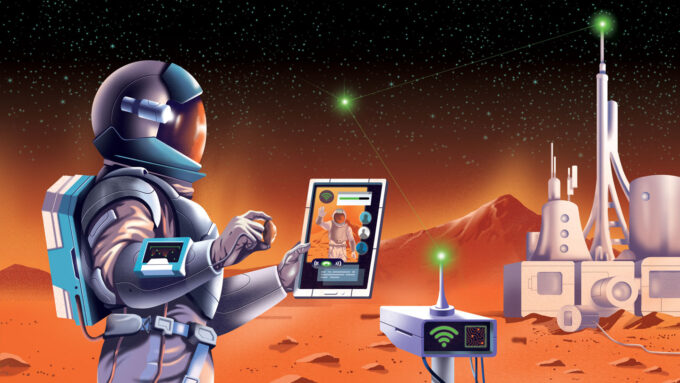
Here’s how to build an internet on Mars
Future Red Planet residents will need to get online to talk to each other and Earth. But that will require a lot of new tech.
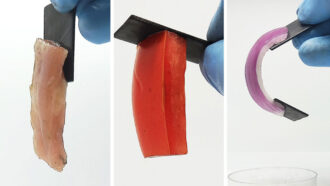
A bit of electricity can glue hard metals to soft materials

See how hummingbirds sneak through small spaces

Let’s learn about photosynthesis
A protein in sweat may protect people from lyme disease, bioelectronics research wins top award at 2024 regeneron isef, comets may be the source of sandy dunes on saturn’s largest moon, word of the week.
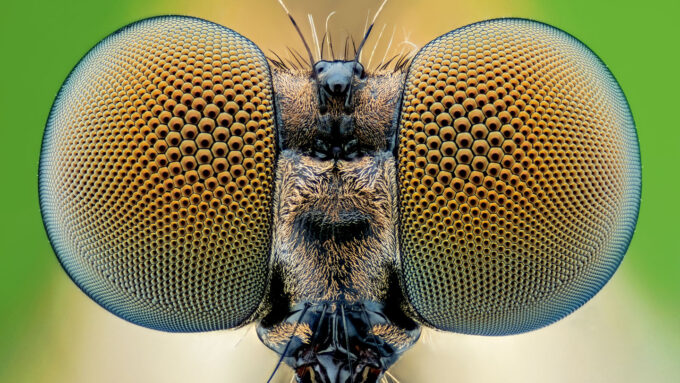
Scientists Say: Compound Eye
Compound eyes made up of many smaller visual structures may not produce crisp images, but they offer a great field of view.
Experiments

Experiment: Make your own cents-able battery
Make your own ‘voltaic pile’ with pennies and nickels, and find out how many coins will make the most electricity!
Technically Fiction

The desert planet in ‘Dune’ is pretty realistic, scientists say
Humans could live on the fictional planet Arrakis from Dune. But thankfully giant sandworms probably could not.
Educators and Parents, Sign Up for The Cheat Sheet
Weekly updates to help you use Science News Explores in the learning environment
Thank you for signing up!
There was a problem signing you up.
What's Hot

The science of ghosts
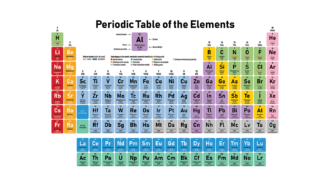
Scientists Say: Periodic table
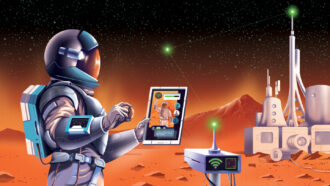
Explainer: Earth — layer by layer

Top 10 tips on how to study smarter, not longer

Surprise! These animals can help fight climate change

Shining, Shimmering, Splendid

Scientists Say: Solar wind
This is a powerful gust of charged particles that flows out from the sun through the solar system.
Explainer: How auroras light up the sky
Newfound ‘dunes’ is among weirdest of northern lights, the weird sky glow called steve is really confusing scientists.
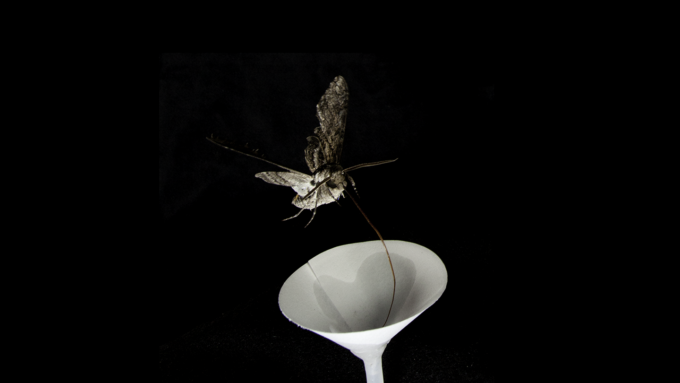
Air pollution can make it harder for pollinators to find flowers
Pollutants that build up in night air can break down the scents that attract pollinating hawkmoths to primrose blooms, disrupting their pollination.

Turning jeans blue with sunlight might help the environment
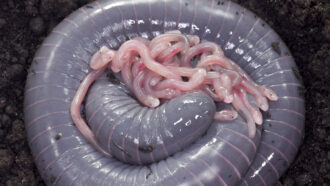
This egg-laying amphibian feeds its babies ‘milk’

What the weird world of protists can teach us about life on Earth

A new tool could guard against deepfake voice scams
More stories.

Earthquake sensor: Taylor Swift fans ‘Shake It Off’
Scientists say: supercontinent, experiment: can plants stop soil erosion, check out the magnetic fields around our galaxy’s central black hole, lego bricks inspired a new way to shape devices for studying liquids, scientists say: digital footprint, environment.
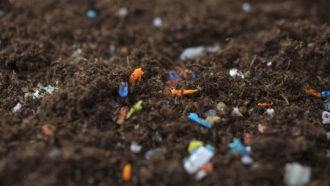
To limit pollution, new recipe makes plastic a treat for microbes
Scientists say: carbon capture, bottled water hosts many thousands of nano-sized plastic bits.
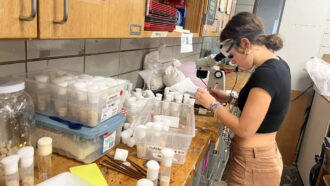
Herbal medicine could help recovery after concussion
Handwriting may boost brain connections that aid memory, scientists say: confirmation bias.
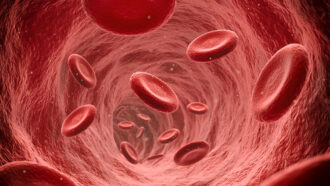
The movie Frozen inspired the icy, 3-D printing of blood vessels
Let’s learn about particles that help us peer inside objects, health & medicine.

With measles outbreaks in 49 countries, should you worry?
Too much noise can harm far more than our ears, a new type of immune cell may cause lifelong allergies.
150+ Life Science Research Topics for High School Students: From Cells to Ecosystems
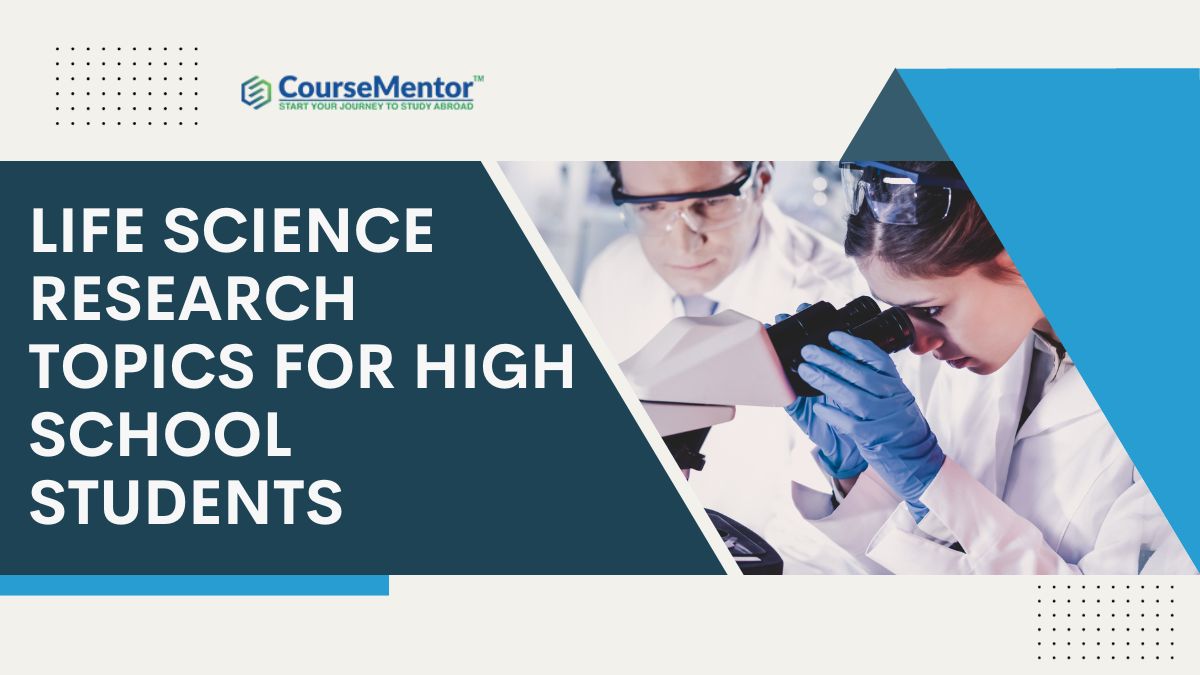
- Post author By admin
- September 26, 2023
Explore a wide range of life science research topics for high school students. Enhance your knowledge and skills with our comprehensive guide.
Ever wondered what makes our world tick? The answer lies in the magic of life science, and guess what? You’re about to dive headfirst into this enchanting world.
No need for complicated jargon or boring textbooks. We’re talking about cool stuff like animals, plants, genes, and mysteries waiting to be unraveled. Imagine being a real-life detective of the natural world!
So, what’s the deal? In this article, we’ve got a bunch of mind-blowing life science research topics designed just for you. They’re not like your usual school assignments. They’re more like a journey into the unknown, a chance to discover things no one else has.
Ready to have a blast and become a science superstar? Awesome, because we’re about to kickstart this amazing adventure together. Let’s roll!
Table of Contents
Why Choose Life Science Research?
You might be wondering why on Earth you should consider diving into the world of life science research, right? Well, let’s unravel the mystery.
It’s Relevant
Life science research is all about the stuff that affects us every day. We’re talking about diseases, ecosystems, genetics – things you encounter in your life.
Problem-Solving Playground
Think of it as a puzzle-solving adventure. Life science research hones your critical thinking skills and turns you into a real-life Sherlock Holmes for all things natural.
Unleash Your Inner Scientist
Ever wanted to be a scientist in a lab coat, conducting experiments and making groundbreaking discoveries? Life science research gives you a taste of that action, letting you form hypotheses and conduct cool experiments.
Career Exploration
Not sure what you want to be when you grow up? Exploring life sciences might help you discover your passion. Whether it’s medicine, ecology, genetics, or something else entirely, the possibilities are endless.

You Can Make a Difference
Believe it or not, your research could contribute to the big book of scientific knowledge. Your discoveries might even change the world!
So, why choose life science research? Because it’s like a thrilling adventure where you’re both the explorer and the discoverer. It’s where your questions lead to answers, and your curiosity shapes the future. Ready to take that first step? Let’s go!
Getting Started: Research Methodology
Getting started with life science research is like gearing up for a fantastic adventure. We’re talking about your very own treasure map, and it’s not as complicated as it might seem. Here’s your basic toolkit to kickstart your research journey:
1. The Scientific Method – Your Detective Kit
Think of this as your secret code for solving mysteries. You start with a question, make a guess (that’s your hypothesis), do some experiments, gather clues (data), and finally, you put it all together to uncover the truth. You’re basically a scientific detective!
2. Data Collection – Gathering Clues
Imagine you’re on a scavenger hunt, but instead of hunting for hidden items, you’re collecting information. This info comes from experiments, observations, or surveys – like puzzle pieces waiting to be put together.
3. Analysis – Piecing It Together
Now, it’s time to play detective again. You take those puzzle pieces (data) and use special tools to fit them together. It’s like solving a jigsaw puzzle, but the picture you reveal is a scientific discovery!
4. Drawing Conclusions – Telling Your Story
You’re not just a detective; you’re also a storyteller. After analyzing your clues, you get to share your findings with the world. It’s like revealing the thrilling ending of a mystery novel – except this time, it’s your discovery.
5. Replicability – Sharing the Adventure
In the world of science, it’s all about teamwork. You’ll document your journey so well that others can follow your steps and have the same adventure. It’s like sharing your treasure map with friends so they can find the same hidden gems.
So, think of research methodology as your trusty guide through the jungle of science. It’s your way of making sure your adventure is both exciting and trustworthy. Get ready, young explorers! Your scientific journey is about to take off, and it’s going to be a blast.
Life Science Research Topics for High School Students
Have a close look at life science research topics for high school students:-
Microbiology and Disease
- Investigating the Antibacterial Properties of Natural Substances.
- Analyzing the Impact of Hand Hygiene on Reducing the Spread of Diseases.
- The Role of Microbes in Decomposition Processes.
- A Comparative Study of Antibiotic Sensitivity in Bacterial Strains.
- Exploring the Microbiome of Different Ecosystems: Soil, Water, and Air.
- Investigating the Effects of Temperature on Microbial Growth.
- The Emergence and Spread of Antibiotic Resistance Genes.
- Microbes in Food: Fermentation and Preservation.
- Analyzing the Microbiome of Human Skin and Its Role in Health.
- Studying the Microbial Diversity in Extreme Environments: Hot Springs and Deep-Sea Vents.
Genetics and Heredity
- Mapping the Inheritance of Genetic Traits in Families.
- Investigating the Genetics of Taste Perception: Bitter Taste Receptors.
- A Study on the Genetic Basis of Rare Genetic Disorders.
- Genetic Variation in Plant Populations: A Local Species Study.
- The Impact of Genetic Mutations on Disease Susceptibility.
- Exploring the Use of CRISPR-Cas9 for Gene Editing in Model Organisms.
- The Genetics of Flower Color Variation in a Plant Species.
- A Comparative Study of Gene Expression in Different Tissues.
- Studying the Inheritance Patterns of Blood Types in Human Populations.
- Investigating the Genetics of Cancer Predisposition in Families.
Ecology and Environmental Studies
- Monitoring the Impact of Pollution on Local Water Bodies.
- Biodiversity Assessment in Urban Parks and Natural Reserves.
- Studying the Effects of Climate Change on Local Flora and Fauna.
- Soil Health Assessment in Agricultural and Natural Ecosystems.
- Investigating the Impact of Invasive Species on Native Biodiversity.
- Analyzing the Role of Wetlands in Flood Control and Water Purification.
- Ecosystem Services Assessment in Urban Environments.
- Urban Heat Island Effect: Mapping and Mitigation Strategies.
- The Impact of Deforestation on Local Bird Populations.
- Restoration of Native Plant Communities in Degraded Ecosystems.
Human Anatomy and Physiology
- The Effect of Different Diets on Gut Microbiota Composition.
- Investigating the Relationship Between Physical Activity and Heart Health.
- Brain Plasticity: How Learning and Experience Change the Brain.
- A Study on the Impact of Sleep Patterns on Cognitive Function.
- The Influence of Age on Muscle Strength and Endurance.
- Hormonal Changes During Puberty: A Comparative Study.
- The Role of Antioxidants in Cellular Aging.
- Investigating the Effects of Stress on Immune System Function.
- Analyzing the Physiology of Human Senses: Vision, Hearing, Taste, and Smell.
- The Role of Gut-Brain Communication in Mood and Mental Health.
Botany and Plant Science
- The Effect of Different Light Conditions on Plant Growth.
- Investigating the Role of Plant Hormones in Growth and Development.
- Studying the Impact of Soil pH on Plant Nutrient Uptake.
- The Relationship Between Mycorrhizal Fungi and Plant Health.
- Analyzing the Adaptations of Desert Plants to Water Scarcity.
- The Influence of Plant Root Exudates on Soil Microbes.
- Investigating the Role of Plant Volatile Compounds in Insect Attraction and Repulsion.
- The Effect of Different Fertilizers on Crop Yield and Soil Health.
- Plant-Microbe Interactions: Beneficial and Pathogenic Relationships.
- Exploring the Nutritional Content of Edible Wild Plants in a Local Area.
Zoology and Animal Behavior
- Investigating Social Hierarchies in Animal Groups: A Study on Dominance.
- The Effect of Environmental Enrichment on Zoo Animal Behavior.
- Studying the Impact of Noise Pollution on Bird Song Patterns.
- Migration Patterns of Local Bird Species: Tracking and Analysis.
- The Influence of Predation Risk on Prey Behavior.
- Investigating Animal Camouflage Strategies in Different Habitats.
- A Comparative Study of Parental Care in Amphibians and Reptiles.
- The Impact of Human Disturbance on Wildlife Behavior in Urban Parks.
- Analyzing the Feeding Behavior of Insectivorous Bats.
- Predator-Prey Coevolution: A Study on Adaptations in Predator and Prey Species.
Environmental Conservation
- Sustainable Agriculture Practices: Soil Health and Crop Yield.
- Ecological Restoration of a Local Wetland Ecosystem.
- Investigating Plastic Recycling Methods for Environmental Impact.
- The Role of Urban Green Spaces in Mitigating Heat Islands.
- Promoting Renewable Energy Sources in a Community: Challenges and Solutions.
- Analyzing the Impact of Conservation Policies on Endangered Species.
- Assessing the Effectiveness of Wildlife Corridors in Reducing Habitat Fragmentation.
- E-Waste Management: Recycling and Environmental Consequences.
- Sustainable Fisheries Management and the Preservation of Marine Ecosystems.
- Promoting Green Roof Adoption in Urban Areas: Benefits and Barriers.
Biotechnology and Genetic Engineering
- CRISPR-Cas9 Gene Editing: Applications in Disease Treatment.
- Investigating the Use of GMOs in Increasing Crop Resilience.
- Cloning as a Tool for Preserving Endangered Species.
- Gene Therapy: Advances and Ethical Considerations.
- Bioremediation Strategies: Cleaning Up Contaminated Sites.
- Analyzing the Potential of Genetically Modified Microbes for Environmental Cleanup.
- Investigating the Use of Biotechnology in Medicine: Vaccines and Therapeutics.
- The Impact of Genetic Engineering on the Pharmaceutical Industry.
- Genome Editing in Microorganisms: Applications in Industry and Medicine.
- Ethical Considerations in Biotechnology: Balancing Progress and Responsibility.
Health and Medicine
- The Effects of Various Diets on Blood Sugar Levels and Diabetes Risk.
- Mental Health Interventions for Adolescents: Efficacy and Accessibility.
- Investigating the Impact of Exercise on Cardiovascular Health in Different Age Groups.
- Analyzing the Microbiome-Gut-Brain Axis and Its Influence on Mental Health.
- The Role of Stress Management Techniques in Improving Overall Health.
- A Comparative Study of Herbal Remedies for Common Ailments.
- The Effects of Different Sleeping Patterns on Cognitive Function.
- Analyzing the Impact of Screen Time on Eye Health in Children.
- The Relationship Between Diet and Skin Health: Acne and Beyond.
- Investigating the Influence of Environmental Factors on Allergies and Asthma.
These research project ideas offer a wide range of opportunities for high school students to explore the fascinating world of life sciences and make meaningful contributions to scientific knowledge.
What are some good research topics for high school students?
Check out some good research topics for high school students:-
Science and Biology
- The Effects of Different Fertilizers on Plant Growth.
- Investigating the Impact of Pollution on Local Water Bodies.
- Analyzing the Efficiency of Various Sunscreens in UV Protection.
- The Role of Microorganisms in Food Spoilage.
- Investigating the Effect of Music on Human Concentration.
- The Influence of Temperature on the Rate of Chemical Reactions.
- A Study on the Behavior of Ants in Response to Different Food Types.
- Investigating the Relationship Between Sleep Patterns and Academic Performance.
- The Effect of Light Exposure on Circadian Rhythms.
- The Impact of Exercise on Heart Rate and Physical Fitness.
Environmental Science
- Analyzing the Impact of Deforestation on Local Climate.
- The Role of Wetlands in Water Purification and Flood Control.
- Investigating the Presence of Microplastics in Local Water Sources.
- Urban Heat Island Effect: Causes and Mitigation Strategies.
- The Effects of Different Soil Types on Plant Growth.
- Renewable Energy Sources: Feasibility and Implementation.
- Analyzing the Environmental Impact of Single-Use Plastics.
- Investigating the Effects of Climate Change on Local Bird Migration Patterns.
- Promoting Recycling and Waste Reduction in Schools.
- Biodiversity Assessment in a Local Ecosystem.
Social Sciences and Psychology
- Investigating the Impact of Bullying on Mental Health.
- Analyzing the Relationship Between Parental Involvement and Academic Success.
- A Study on the Effects of Peer Pressure on Decision-Making.
- The Role of Gender Stereotypes in Career Choices.
- Investigating the Impact of Video Games on Aggressive Behavior.
- The Effect of Music on Mood and Emotions.
- Analyzing the Factors Influencing Voting Behavior in Young Adults.
- The Influence of Advertising on Consumer Choices.
- A Study on the Effects of Stress on Cognitive Performance.
- The Influence of Social Media on Teenagers’ Self-Esteem.
Technology and Engineering
- Investigating the Efficiency of Different Insulation Materials.
- Designing and Testing a Wind-Powered Water Pump.
- Analyzing the Impact of Smartphone Usage on Productivity.
- The Development of a Simple Home Automation System.
- Investigating the Use of Drones in Environmental Monitoring.
- Building a Simple Electric Vehicle Model.
- A Study on Internet Security: Protecting Personal Data.
- Analyzing the Energy Consumption of Household Appliances.
- Designing an Eco-Friendly and Cost-Effective Home.
- Building a Solar-Powered Charger for Mobile Devices.
History and Social Studies
- A Study on the Contributions of a Local Historical Figure.
- Investigating the Causes and Consequences of a Historical Conflict.
- The Role of Women in a Specific Historical Period.
- Analyzing the Impact of Immigration on Local Communities.
- Investigating the Evolution of a Local Cultural Tradition.
- A Comparative Study of Political Systems in Different Countries.
- The Role of Propaganda in Shaping Public Opinion.
- Analyzing the Impact of Social Movements on Policy Change.
- Investigating the History and Cultural Significance of a Local Landmark.
- Analyzing the Impact of Historical Events on Contemporary Society.
These research topics provide a diverse range of opportunities for high school students to explore their interests, develop critical thinking skills, and contribute to their academic and scientific communities.
Students can select topics that align with their passions and curriculum requirements to make their research projects both engaging and meaningful.
What are the possible topics of life science?
Have a close look at the possible topics for life science:-
Microbiology
- Bacterial growth and antibiotic resistance.
- The role of viruses in diseases.
- Microbial diversity in different environments.
- Fermentation processes and their applications.
Genetics and Genomics
- Genetic inheritance patterns in humans and other organisms.
- The impact of genetic mutations on health.
- Genomic sequencing and personalized medicine.
- Gene editing technologies like CRISPR-Cas9.
Ecology and Environmental Science
- Biodiversity and conservation.
- Ecosystem dynamics and food webs.
- Climate change and its effects on ecosystems.
- Environmental pollution and its impact on wildlife.
- Photosynthesis and plant growth.
- Plant adaptations to different environments.
- Plant genetics and breeding for improved crops.
- The role of plants in carbon sequestration.
- Animal migration patterns and navigation.
- Predator-prey interactions in ecosystems.
- Social behavior in animal communities.
- Animal adaptations to extreme environments.
Physiology and Anatomy
- Human organ systems and their functions.
- Cellular processes like respiration and metabolism .
- Comparative anatomy of different species.
- Neurobiology and the workings of the human brain.
Evolutionary Biology
- The theory of evolution by natural selection.
- Fossil evidence of evolution.
- Comparative genomics and evolutionary relationships.
- Human evolution and our closest relatives.
Marine Biology
- Ocean ecosystems and marine biodiversity.
- Coral reef conservation and threats.
- Deep-sea exploration and the discovery of new species.
- The role of marine organisms in biotechnology.
- The immune system’s response to infections.
- Vaccination and herd immunity.
- Autoimmune diseases and allergies.
- Immunotherapy for cancer treatment.
Epidemiology
- Disease outbreaks and epidemiological investigations.
- Public health interventions to control infectious diseases.
- Tracking and modeling the spread of diseases.
- Global health challenges and pandemics.
- Conservation strategies for endangered species.
- Sustainable agriculture and forestry practices.
- Habitat restoration and rebuilding efforts.
- Conservation genetics and preserving genetic diversity.
- CRISPR technology and gene editing.
- Biopharmaceuticals and the production of biofuels.
- Genetically modified organisms (GMOs) in agriculture.
- Bioremediation and environmental cleanup.
These topics within life science provide a rich and diverse array of opportunities for research, study, and exploration.
Whether you’re interested in understanding the natural world, human health, or the environment, life science offers a wide range of fascinating avenues to explore.
What are the interesting research topics about science?
Certainly, science offers a wide range of interesting research topics across various disciplines. Here are some captivating research topics in science:
Artificial Intelligence and Machine Learning
- Developing advanced AI algorithms for medical diagnosis.
- Natural language processing and understanding for chatbots.
- Reinforcement learning in robotics and autonomous systems.
- Ethical considerations in AI development.
Space Exploration and Astronomy
- The search for exoplanets and habitable zones.
- Understanding dark matter and dark energy.
- Space colonization: Challenges and possibilities.
- The future of space telescopes and observatories.
Environmental Science and Climate Change
- Climate modeling and predictions.
- Impacts of climate change on ecosystems and biodiversity.
- Sustainable agriculture and food security in a changing climate.
- Innovative approaches to renewable energy production.
Nanotechnology
- Nanomedicine and its applications in disease treatment.
- Nanomaterials for clean water and pollution control.
- Nanoelectronics and the future of computing.
- Ethical and safety concerns in nanotechnology.
- Personalized medicine and genomics-based treatments.
- The role of epigenetics in health and disease.
- Human genetic diversity and its implications.
Earth and Geosciences
- Natural disaster prediction and mitigation strategies.
- Plate tectonics and the movement of continents.
- The geology of other planets in our solar system.
- Climate history and the study of ice cores.
Biomedical Research
- Stem cell therapy and regenerative medicine.
- Neurobiology and the quest to understand the brain.
- Vaccine development and immunotherapy for cancer.
- Genetic factors in aging and longevity.
Robotics and Automation
- Advances in humanoid and bio-inspired robotics.
- Applications of robotics in healthcare and surgery.
- Autonomous vehicles and their impact on transportation.
- Human-robot interaction and social robots.
Energy and Sustainable Technology
- Energy-efficient building materials and design.
- The potential of fusion energy as a clean power source.
- Battery technology for renewable energy storage.
- Smart grids and the future of energy distribution.
Particle Physics
- The search for the Higgs boson and beyond.
- The nature of dark matter and its properties.
- Particle accelerators and their role in high-energy physics.
- The Standard Model and its limitations.
Oceanography and Marine Sciences
- Ocean acidification and its effects on marine life.
- Coral reef conservation and restoration efforts.
- Studying the impact of climate change on ocean currents.
Archaeology and Anthropology
- Uncovering ancient civilizations through archaeology.
- Genetic studies to trace human migration and evolution.
- Anthropological research on cultural diversity and adaptation.
- Ethical considerations in the study of indigenous cultures.
These research topics span a wide spectrum of scientific disciplines, offering countless opportunities for exploration, discovery, and innovation in the ever-evolving world of science.
Depending on your interests, you can delve into any of these areas to contribute to our understanding of the natural world and its many complexities.
How do I choose a research topic for high school?
Absolutely, let’s make the process of choosing a research topic for high school more natural, simple, and engaging:
Follow Your Passions
Start by thinking about what really fires you up. What subjects or topics make you curious and excited? Whether it’s space, animals, or history, your interests are a great place to begin.
Zoom In on Your Interests
Now, let’s narrow it down a bit. If you’re into science, do you prefer biology, chemistry, or something else? If you’re leaning towards history, is there a particular time period that fascinates you?
Know Your Strengths
Think about what you’re good at in school. If you’re acing math, maybe a research topic related to mathematics could be your jam.
Real-World Relevance
Look around you. Are there any current issues or events that pique your interest? High school research is a chance to tackle real-world problems you care about.
Seek Advice
Chat with your teachers or mentors. They’re like your research spirit guides and can help you find exciting topics that match your skills and passions.
Use Available Resources
Consider what tools and resources you have access to. Maybe there’s a cool experiment you can do right at home.
Think Long-Term
Imagine where you see yourself in the future. Is there a subject that connects to your dream job or college major?
Reflect on Past Fun
Remember any school projects you actually enjoyed? These can be a goldmine for research inspiration.
Let Your Imagination Run Wild
Brainstorm like you’re dreaming up your favorite adventure. Write down all the questions you’d love to answer.
Share and Chat
Tell your friends, family, or mentors about your ideas and get them in on the excitement. They might have amazing suggestions!
Passion is the Key
Above all, pick a topic that makes your heart race with enthusiasm. If you’re truly passionate, your research journey will feel like an awesome quest, not a chore.
Choosing your high school research topic should be like picking the theme for your grand adventure.
When you’re motivated and captivated, you’ll make incredible discoveries along the way. Ready to embark on this research journey?
We have covered some of the best life science research topics for high school students. These life science research topics are quite simple and engaging for the students.
There are a lot of opportunities associated with these project ideas that can help you to explore a lot more about life science.
So pick the project as per your interest. You can also take the help of your fellows and mentors. Through the work on these projects you would enjoy and explore new things. So let’s have a try on these project ideas.
- What is the importance of life science research for high school students? Life science research enhances critical thinking, problem-solving, and scientific inquiry skills, preparing students for future academic and career opportunities.
- How can I choose the right life science topic for my research project? Choose a topic that genuinely interests you and aligns with your goals. Consider seeking guidance from teachers or mentors.
- Are there any online resources for high school students interested in life science research? Yes, numerous online platforms offer educational resources and research opportunities for aspiring young scientists.
- Can I collaborate with a mentor or scientist for my research project? Collaboration with mentors or scientists can be highly beneficial and is encouraged in the field of life sciences.
- What are some potential career paths for those passionate about life sciences? Careers in medicine, ecology, genetics, microbiology, and environmental science are among the many options for those passionate about life sciences.
- australia (2)
- duolingo (13)
- Education (278)
- General (75)
- How To (16)
- IELTS (127)
- Latest Updates (162)
- Malta Visa (6)
- Permanent residency (1)
- Programming (31)
- Scholarship (1)
- Sponsored (4)
- Study Abroad (187)
- Technology (12)
- work permit (8)
Recent Posts
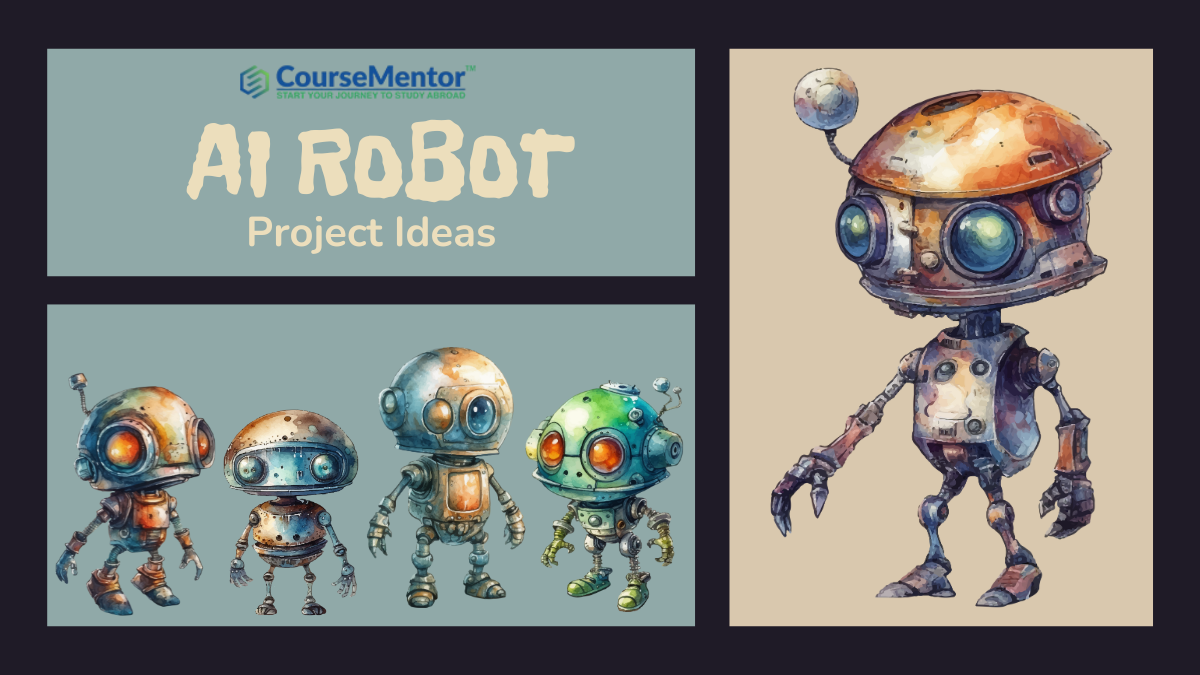
What are your chances of acceptance?
Calculate for all schools, your chance of acceptance.
Your chancing factors
Extracurriculars.
20 Science Research Competitions for High Schoolers
What’s covered:, why should you enter a science research competition, how do science research competitions affect my admissions chances.
Participation in science research competitions offers many benefits to students; for example, it can make them more competitive candidates for college admissions and provide them with valuable experience in a sought-after field. There’s a wide variety of science research competitions for high schoolers, including the high-profile contests listed below.
Entering a science research competition demonstrates that you take initiative and that you care about academics beyond the grades in your courses, both of which are qualities that colleges appreciate in prospective students.
Participation in competitions is a strong extracurricular activity, and successes—like making the finals or winning—can provide you with a chance to earn a scholarship, make your college application more attention-grabbing, or even open doors, such as laying the groundwork for a career in science research and helping you land an internship.
Another way to showcase your initiative and skills is to work on an independent research paper. There are a number of ways to do independent research, including working with a high school teacher, reaching out to local professors, or taking part in a structured research program.
For example, the Lumiere Research Scholar Program is one type of structured research program tailored for high school students. In the program, you work 1-1 with a researcher on an independent research project. The program is run by researchers from Harvard and helps create the structure for you to get started quickly doing your own research. Many of Lumiere’s alums have used their research in the structured program to then apply to research competitions like ISEF.
Whether you participate in a structured program first or dive right into a competition, engaging in research allows you to explore one of your interests deeply, while simultaneously boosting your profile for college admissions.
1. American Academy of Neurology – Neuroscience Research Prize
Grades: 9-12
Type: National
The AAN Neuroscience Research Prize competition challenges students to investigate problems regarding the brain or nervous system. The competition is only open to individual students—group projects are ineligible. Teachers are encouraged to provide guidance and support; however, they should allow students to demonstrate their own creativity. Winners and their projects are highlighted at the AAN Annual Meeting.
2. Envirothon
Type: State and National
Envirothon is North America’s largest environmental education competition, with more than 25,000 students participating in the multi-level competition each year. Student teams are first challenged at state-level competitions with the winners moving on to face top teams from across the globe at the annual international competition.
The international competition is a six-day event held in a different location each summer—for example, in an open range of the western U.S. one year, and at a Maritime coastal community of eastern Canada the next. The competition offers participants the chance to win thousands of dollars in scholarships.
3. Regeneron International Science and Engineering Fair (ISEF)
Type: Local, Regional, and International
The Regeneron ISEF is the world’s largest international pre-college science competition—more than 1,800 high school students, representing more than 75 countries, regions, and territories, take part. Students showcase independent research and compete for roughly $8 million in awards across 21 categories .
This is not a group-based competition—individual students enroll in local school science fairs before advancing to upper-level competitions in hopes of reaching the national stage.
4. National Science Bowl
Hosted by the Department of Energy in Washington, D.C., the National Science Bowl is a highly publicized competition that tests students’ knowledge in all areas of science and mathematics, including biology, chemistry, earth science, physics, energy, and math. Students compete in teams of four (plus an alternate) and have a teacher who serves as an advisor.
The National Science Bowl is one of the largest science competitions in the country—roughly 330,000 students have participated in it throughout its 32-year history.
5. National Science Olympiad
One of the nation’s premier STEM competitions, the National Science Olympiad is the pinnacle of achievement for the country’s top Science Olympiad teams. In 2022, the U.S. top 120 teams, plus a Global Ambassador Team from Japan (for a total of more than 2,000 students) squared off in a variety of events for the chance to be named the Science Olympiad National Champions.
Teams also compete annually for the opportunity to win prizes and scholarships, including a one-time $10,000 Science Olympiad Founders’ Scholarship. About 6,000 teams compete each year, beginning at the regional level in hopes of reaching the national competition.
6. Regeneron Science Talent Search (STS)
Established in 1942 and hosted by the Society for Science, the Regeneron Science Talent Search is considered the most prestigious high school science research competition in the nation. The competition tasks young scientists with presenting their original research before a panel of nationally recognized professional scientists.
Of the 1,800 entrants, 300 Regeneron STS scholars are selected—they and their schools are awarded $2,000 each. Forty finalists are then picked from the pool of scholars. They receive an all-expenses-paid trip to Washington, D.C., where they compete for an additional $1.8 million in awards, with a top prize of $250,000.
7. Stockholm Junior Water Prize
Type: Regional, State, National, and International
In this competition, students from around the world seek to address the current and future water challenges facing the world. Competition for the Stockholm Junior Water Prize occurs on four levels: regional, state, national, and international.
- Regional winners receive a certificate and a nomination to compete in the state competition.
- State winners receive a medal and an all-expenses-paid trip to compete in the national competition.
- National winners receive a trophy, a $10,000 scholarship, and an all-expenses-paid trip to the international competition in Stockholm, Sweden.
- International winners receive a crystal trophy and a $15,000 scholarship, along with a $5,000 award for their school.
In order to participate, students can begin to research and develop a practical project proposal either as an individual or with a group. To reach the national level, students must be nominated by a national organizer representing their country.
8. TOPSS Competition for High School Psychology Students
To participate in this competition, students must submit a video of up to 3 minutes that demonstrates an interest in and understanding of a topic in psychology that they think could benefit their local community and improve lives. Students must also utilize at least one peer-reviewed research study on their topic, and must include a closing slide citing their source(s). Up to three winners are chosen to receive a $300 scholarship.
9. Junior Science and Humanities Symposium (JSHS) National Competition
Type: Regional and National
The Junior Science and Humanities Symposium National Competition is one of the country’s longest-running STEM competitions—participants are required to submit and present scientific research papers and compete for military-sponsored undergraduate scholarships.
The JSHS national competition is the result of a collaborative effort between the Department of Defense and academic research institutes nationwide. It is designed to emulate a professional symposium. Research projects are organized into categories such as Environmental Science, Engineering and Technology, and Medicine and Health. After competing regionally, about 250 students are chosen to attend an annual symposium to showcase their work.
10. MIT THINK Scholars Program
In the fall of each year, interested students can enter project proposals into competition for selection from a group of undergraduate students at MIT. If selected, students will be able to carry out their project—receiving up to $1000 in funding to complete their research. They’ll also be invited to a four-day symposium at MIT the following year.
Finalists are guided with weekly mentorship and will have the opportunity to present their findings to MIT students and faculty at the end of the program.
11. Toshiba/NSTA ExploraVision
Grades: K-12
In this competition, students compete in groups of 2-4 to select a technology and forecast how it will evolve over the next decade or beyond, while discussing the scientific achievements that will need to be made to get there.
Students will submit an abstract as well as a detailed description paper that is not to exceed 11 pages. In doing so, they will be entered into competition and considered for a number of financial awards, as well as a trip to Washington, D.C., for the ExploraVision Awards Weekend. The competition is nationally recognized and is sponsored by Toshiba and the National Science Teachers Association.
12. Conrad Challenge
Teams of 2-5 students are tasked with designing and detailing project proposals to tackle various problems categories such as Aerospace & Aviation, Health & Nutrition, Cyber-Technology & Security, and Energy & Environment. In doing so, they will identify problems in the world and come up with a feasible and innovative solution, working with judges and mentors along the way.
Finalists will be selected from the competing teams and invited to the Innovation Summit in Houston, where they will pitch their projects to judges and potentially receive numerous prizes and awards, ranging from scholarships to consulting services.
13. USA Biolympiad Competition
Type: National and International
Over the course of two years, students will undergo multiple rounds of testing that will eventually pinpoint twenty finalists to be selected for training in a residential program with the goal of representing the USA in the International Biology Olympiad. As such, this is one of the most prestigious and difficult competitions, not just in biology, but in all high school sciences. However, the experience is second to none, and is the ultimate test for students devoted to the future of biology.
14. Davidson Fellows Scholarship
While not exclusive to STEM, the Davidson Fellows program offers various major scholarships for students interested in careers in sciences. Listed as one of the “ 10 Biggest Scholarships in the World ,” this program requires students to submit a variety of components related to an independent research study with the broad goal of contributing positively to society through the advancement of science. Students will submit multiple essays as well as a video summary, and must include an additional visual model reporting their findings.
15. Destination Imagination
Type: Regional, State, National, International
Destination Imagination is another worldwide competition that includes a variety of subjects, but it specializes in science-based challenges. Students will form teams and choose from a list of different challenges to compete in in categories such as Technical, Scientific, and Engineering.
Students will solve these challenges and present their solutions in regional competitions. Regional winners will move on to statewide competitions before being invited to the Global Finals, where over 8,000 students from 28 states and 12 countries compete for awards. 150,000 students compete annually in the competition at some level.
16. Breakthrough Junior Challenge
For students looking for a more creatively inspired and unconventional competition, the Breakthrough Junior Challenge tasks students with creating a short two-minute video in which they explain and demonstrate a complex scientific concept.
Does that sound simple enough? Over 2,400 students from over 100 countries submitted videos in 2022, meaning there’s no shortage of competition here. Winning applicants will need to demonstrate immense creativity and understanding of complex scientific concepts, but rest assured—the prize is worth the difficulty.
The winner will receive a $250,000 scholarship for accredited colleges and universities, as well as a $100,000 grant to the winner’s school for the development of a science lab, and a $50,000 award to a teacher of the winner’s choosing.
17. Biotechnology Institute: BioGENEius Challenge
Students from across the country are invited to participate in the Biotechnology Institute’s BioGENEius Challenge, where they’ll be able to choose to complete a project in the Healthcare, Sustainability, or Environment categories. If accepted, students will need to complete an extensive research project and demonstrate results, and then compete in either local or a virtual “At-Large” competition, with other student competitors from around the world.
18. Genes in Space
Grades: 7-12
For students interested in the science of space and its overlap with our current understanding of the human genome, this competition combines these two worlds by tasking students with designing a DNA experiment that addresses challenges in space exploration and travel.
Students will submit a project proposal, and semifinalists will be selected to pitch their experiments in Seattle. After doing so, finalists will be selected to work with mentors and scientists from schools, such as Harvard and MIT, to design a real-life experiment. One finalist’s experiment will win the opportunity to be conducted at the International Space Station. The lucky winner will travel to the Kennedy Space Center to see the winning experiment’s launch!
19. Odyssey of the Mind
Students will form teams to compete in a variety of STEM-based challenges in this global problem-solving competition, culminating in a World Finals competition that takes place in East Lansing, Michigan.
Over 800 teams from 33 states and 15 countries compete each year in challenges ranging from designing vehicles to building small structures that can withstand hundreds of pounds. These challenges are designed to encourage creativity in the performative and presentational elements of competition.
20. U.S. National Chemistry Olympiad
Type: Regional, National, International
Students interested in Chemistry are able to participate in the USNCO, in which they’ll take rigorous exams to prove their skills in the Chemistry field. Top test-takers will be selected to attend a prestigious Study Camp, where they’ll compete for the chance to represent the U.S. at the International Chemistry Olympiad. Interested students can contact their Local Coordinator, who can be found through the program’s website.
The influence your participation in science research competitions can have on your college admissions varies—considerations such as how well you performed and the prestige of the event factor into how admissions officers view the competition. That being said, the four tiers of extracurricular activities provide a good general guide for understanding how colleges view your activities outside the classroom.
The most esteemed and well-known science research competitions are organized into Tiers 1 and 2. Extracurricular activities in these categories are extremely rare, demonstrate exceptional achievement, and hold considerable sway with admissions officers. Tiers 3 and 4 are reserved for more modest accomplishments—like winning a regional (rather than a national) competition—and carry less weight at colleges than their higher-tiered counterparts.
Generally, participation in a science research competition will be considered at least a Tier 2 activity. As stated before, this varies depending on the competition and your performance. For example, being a finalist or winner in something like the Regeneron Science Talent Search or the International Biology Olympiad—prestigious national and international competitions—is very likely to be considered a Tier 1 achievement.
However, lower-tiered extracurriculars are still valuable, as they show colleges a more well-rounded picture of you as a student, and highlight your desire to pursue your interests outside of school.
Curious how your participation in science research competitions affects your odds of college admissions? Collegevine can help. Our free chancing calculator uses factors like grades, test scores, and extracurricular activities—like science research competitions— to calculate your chances of getting into hundreds of colleges across the country! You can even use the information provided to identify where you can improve your college profile and ultimately bolster your odds of getting into your dream school.
Disclaimer: This post includes content sponsored by Lumiere Education.
Related CollegeVine Blog Posts

- Write my thesis
- Thesis writers
- Buy thesis papers
- Bachelor thesis
- Master's thesis
- Thesis editing services
- Thesis proofreading services
- Buy a thesis online
- Write my dissertation
- Dissertation proposal help
- Pay for dissertation
- Custom dissertation
- Dissertation help online
- Buy dissertation online
- Cheap dissertation
- Dissertation editing services
- Write my research paper
- Buy research paper online
- Pay for research paper
- Research paper help
- Order research paper
- Custom research paper
- Cheap research paper
- Research papers for sale
- Thesis subjects
- How It Works
80+ Science Research Paper Topics Ideas For Students

Essay writing or writing dissertation is an integral part of education at any level, middle school, high school, or college. Some of the most common essays are on science research topics, and they are also quite interesting. However, choosing research paper topics isn’t as straightforward as you’d like. You’ll need to carry out a survey on and draw inspiration from several scientific research topics before finally choosing one. Choosing science topics, especially if they are argumentative essay topics , to write about can be a frustrating task, especially when science is a pretty wide subject. If you need inspiration on interesting science topics, we’ll give you some science research paper ideas. But, first, let’s talk about how to choose the best science research paper topics – it makes things easier.
What Are Some Science Topics You Can Write About?
Interesting science research topics, ideas of science research topics for high school students, science research topics for college students, science research topics for middle school, scientific research question examples, science presentation ideas, cool science topics to research, ideas of scientific topics for research on nanotechnology, fascinating ideas for science research projects, interesting science topics for high school research papers, tips for choosing science research topics.
Being a very broad subject, students often find choosing a science topic for a research paper difficult. However, the secret is knowing what scientific research questions will make for a good paper, and what people will want to read. So, when choosing science topics for papers, here are tips you can follow to make the task easier.
- Choose cool science topics you’re interested in and that’ll interest your readers.
- Search online for research question examples science for ideas on what your paper should be about.
- Avoid choosing too-broad research topics for high school, to ensure your work is well detailed.
- Consider contemporary scientific research questions concerning recent happenings; they can be fun to write
- Read your notes and online academic papers for inspiration on good science research paper topics.
- Choose simple but highly informative research topics for high school students.
- Choose good science topics you have some knowledge of and can confidently talk about.
- Learn how to choose science topics for high school to make things easier.
- Be familiar with the dos and don’ts of choosing scientific research paper topics.
- Choose a scientific topic for research papers that has enough accessible information.
The Dos and Don’ts of Choosing Science Topics
Knowing the dos and don’ts of choosing a science title helps you select a good topic and ultimately write an outstanding paper. So, when searching for science topics for presentations,
- Do understand that there are different topics in science you can research on;
- Do read extensively for science research paper ideas; it helps you know what to write about;
- Don’t include words like “Research of” or “Study of” in your chosen science topics to research;
- Don’t choose high school science research paper topics with scanty or inaccessible information available;
- Do check online for interesting science research ideas on how to write your paper;
- Feel free to ask your instructor, colleagues, or seniors for scientific research ideas.
When searching for interesting science topics or social media research topics related to science to writing on, you will find different ones on different subjects, which can be confusing. You can follow the tips we listed for choosing science-related topics for a research paper. Meanwhile, here are some science paper topics you can use if none is forthcoming.
- Is there a move for the Covid-19 vaccine?
- What “flattening the curve” means
- Molecular evidence of humans interbreeding with Neanderthals
- Impact of cardio exercise on heart health
- The importance of exploring the solar system
- Can a comet strike the earth?
- The Hubble Space Telescope
- Top ten chemistry careers
- Acid rain effect aquatic plants’ growth
- Room color and human behavior
- How can plants grow in pots?
- Water’s surface tension weight capacity
- What does the paleo diet mean?
- Is Pluto still a planet?
- The future of commercial space flight
- Do you inherit fingerprint patterns?
- Ways in which handwashing prevents the spread of the Covid-19 virus
- Molecular biological research on rare genetic disorders impact on understanding cancer
- Do men pass on genetic abnormalities to their posterity as they age?
- How can men’s exercise affect the traits they pass on to their children?
- Is there really life on Mars; has there ever been?
- Ways of solving the problem of junk space
- The importance of Dark Matter
- Black holes
- Different ways to keep ice from defrosting
- Are pet hairs harmful to the human body?
- Some of the germs you’ve seen in your school
- The effect of music on your assimilation ability
- The types of food dogs prefer the best
- Good hygienic practices for keeping clean
- Foods that develop molds the fastest
- How different body parts aid the effective functioning of the system
- Do worms in the soil really affect plant growth and how?
- Can light brightness make plants grow well?
- What kinds of fertilizers work best, chemical or natural?
- Can mice (or any animal of your choice) learn?
- How can age affect the human reaction?
- Why does water boil faster when put in salt?
- Can food affect the heart, how?
- Can background noise interfere with learning and assimilation?
- Can Higgs Boson destroy the universe?
- Effects of sunspots on man
- Should humans live in space?
- The most important technological innovations in medicinal chemistry in recent years
- The danger of chemicals emitted from pharmaceutical companies
- The importance of big data and bioinformatics to chemical research
- The sugar chemistry behind making candy
- Biomacromolecules
- Trends in India’s medicinal chemistry research
- Nuclear fusion
- Reproduction in mammals
- How do fish mate?
- How useful are science museums in teaching science?
- Why do birds have beautiful feathers?
- The safety of offshore drilling
- The importance of climate change legislation
- Hydraulic fracking’s negative effects
- Uses of microelectronics
- Nanotechnology in medicine
- Nanotechnology for cancer treatment
- Can nanofibers repair brain injuries?
- Effect of nanomedicine on human lifespan
- Nanomaterial
- How nanotechnology helps in patient diagnosis
- How to reduce antibiotic use in agriculture
- The ethics of stem cell research
- The best leukemia treatment
- Gene therapy
- Causes of skin cancer
- Colonoscopy testing on colon cancer
- Why eliminating malaria is difficult
- The possibility of predicting the next pandemic
- Do childhood vaccines prevent diseases?
- How cells shield the body against diseases
- Should wild animals interact with humans?
- Are self-driving cars good?
- Regulating sugar use
- Different types of headaches
- Can migraine cause death?
- The ideal weight for living long
Feel free to choose from this scientific research topics list for your science research paper. There are many things to research where science is concerned, including stem research topics , among others. There is no shortage of scientific topics to research and choosing the best one gets easy when you know how to. If you’ve chosen a topic and you need help writing on them, you can contact our professional writing service. We have a team of experts who can write on any science topic and ensure you meet your deadline.
Leave a Reply Cancel reply
- Grades 6-12
- School Leaders
Enter Today's Teacher Appreciation Giveaway!
70 Best High School Science Fair Projects in Every Subject
Fire up the Bunsen burners!
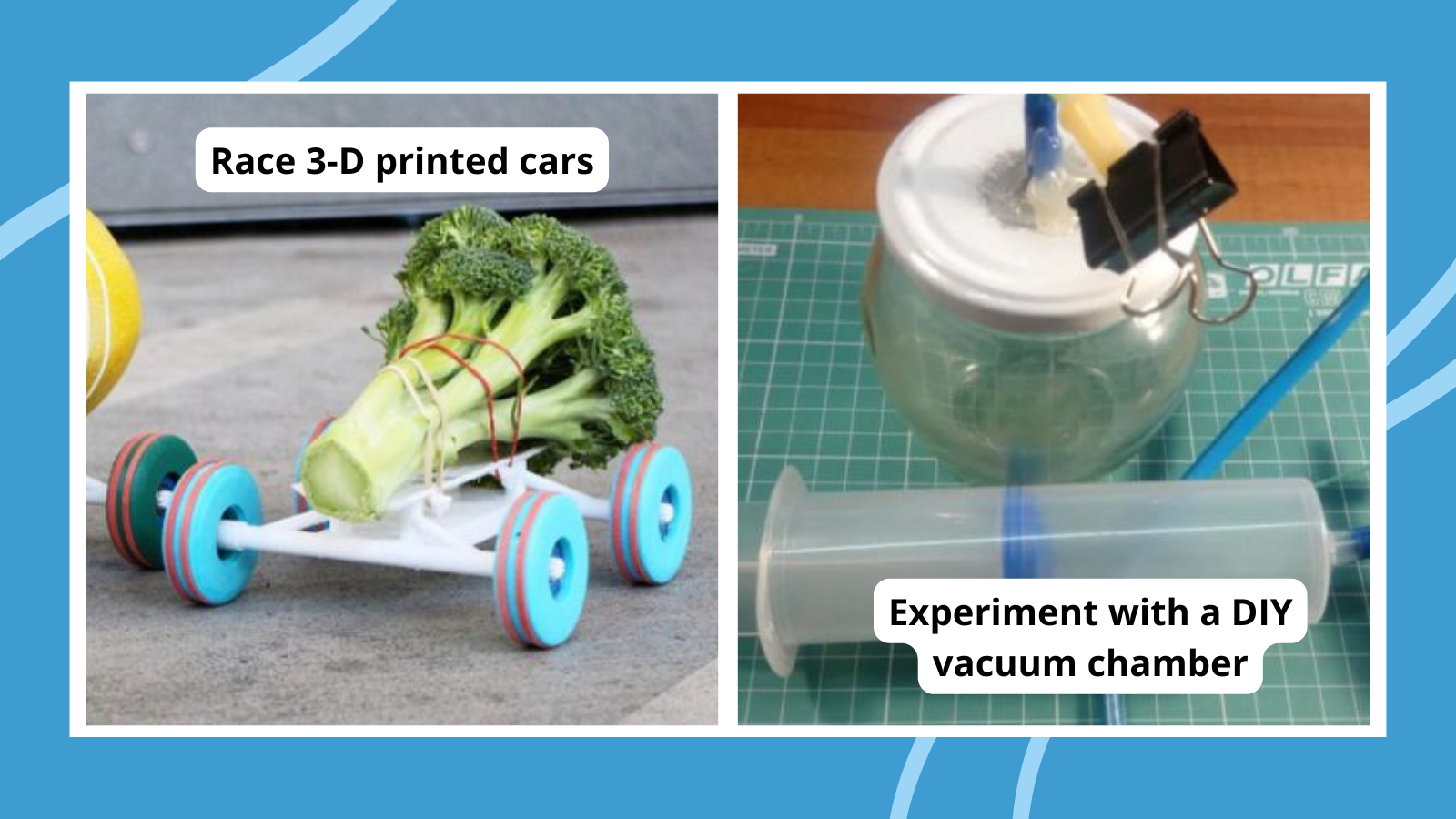
The cool thing about high school science fair projects is that kids are old enough to tackle some pretty amazing concepts. Some science experiments for high school are just advanced versions of simpler projects they did when they were younger, with detailed calculations or fewer instructions. Other projects involve fire, chemicals, or other materials they couldn’t use before.
Note: Some of these projects were written as classroom labs but can be adapted to become science fair projects too. Just consider variables that you can change up, like materials or other parameters. That changes a classroom activity into a true scientific method experiment!
To make it easier to find the right high school science fair project idea for you, we’ve rated all the projects by difficulty and the materials needed:
Difficulty:
- Easy: Low or no-prep experiments you can do pretty much anytime
- Medium: These take a little more setup or a longer time to complete
- Advanced: Experiments like these take a fairly big commitment of time or effort
- Basic: Simple items you probably already have around the house
- Medium: Items that you might not already have but are easy to get your hands on
- Advanced: These require specialized or more expensive supplies to complete
- Biology and Life Sciences High School Science Fair Projects
Chemistry High School Science Fair Projects
Physics high school science fair projects, engineering high school stem fair projects, biology and life science high school science fair projects.
Explore the living world with these biology science project ideas, learning more about plants, animals, the environment, and much more.
Extract DNA from an onion
Difficulty: Medium / Materials: Medium
You don’t need a lot of supplies to perform this experiment, but it’s impressive nonetheless. Turn this into a science fair project by trying it with other fruits and vegetables too.
Re-create Mendel’s pea plant experiment
Gregor Mendel’s pea plant experiments were some of the first to explore inherited traits and genetics. Try your own cross-pollination experiments with fast-growing plants like peas or beans.
Make plants move with light
By this age, kids know that many plants move toward sunlight, a process known as phototropism. So high school science fair projects on this topic need to introduce variables into the process, like covering seedling parts with different materials to see the effects.
Test the 5-second rule
We’d all like to know the answer to this one: Is it really safe to eat food you’ve dropped on the floor? Design and conduct an experiment to find out (although we think we might already know the answer).
Find out if color affects taste
Just how interlinked are all our senses? Does the sight of food affect how it tastes? Find out with a fun food science fair project like this one!
See the effects of antibiotics on bacteria
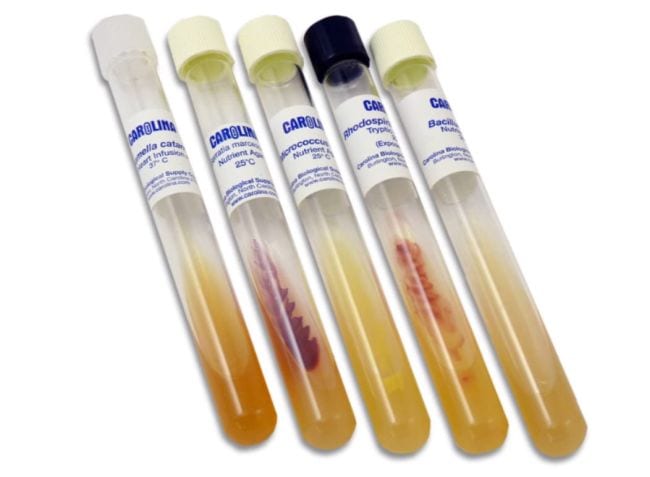
Difficulty: Medium / Materials: Advanced
Bacteria can be divided into two groups: gram-positive and gram-negative. In this experiment, students first determine the two groups, then try the effects of various antibiotics on them. You can get a gram stain kit , bacillus cereus and rhodospirillum rubrum cultures, and antibiotic discs from Home Science Tools.
Learn more: Antibiotics Project at Home Science Tools
Witness the carbon cycle in action

Experiment with the effects of light on the carbon cycle. Make this science fair project even more interesting by adding some small aquatic animals like snails or fish into the mix.
Learn more: Carbon Cycle at Science Lessons That Rock
Look for cell mitosis in an onion
Cell mitosis (division) is actually easy to see in action when you look at onion root tips under a microscope. Students will be amazed to see science theory become science reality right before their eyes. Adapt this lab into a high school science fair project by applying the process to other organisms too.
Test the effects of disinfectants

Grow bacteria in a petri dish along with paper disks soaked in various antiseptics and disinfectants. You’ll be able to see which ones effectively inhibit bacteria growth.
Learn more: Effectiveness of Antiseptics and Disinfectants at Amy Brown Science
Pit hydroponics against soil
Growing vegetables without soil (hydroponics) is a popular trend, allowing people to garden just about anywhere.
More Life Sciences and Biology Science Fair Projects for High School
Use these questions and ideas to design your own experiment:
- Explore ways to prevent soil erosion.
- What are the most accurate methods of predicting various weather patterns?
- Try out various fertilization methods to find the best and safest way to increase crop yield.
- What’s the best way to prevent mold growth on food for long-term storage?
- Does exposure to smoke or other air pollutants affect plant growth?
- Compare the chemical and/or bacterial content of various water sources (bottled, tap, spring, well water, etc.).
- Explore ways to clean up after an oil spill on land or water.
- Conduct a wildlife field survey in a given area and compare it to results from previous surveys.
- Find a new use for plastic bottles or bags to keep them out of landfills.
- Devise a way to desalinate seawater and make it safe to drink.
Bunsen burners, beakers and test tubes, and the possibility of (controlled) explosions? No wonder chemistry is such a popular topic for high school science fair projects!
Break apart covalent bonds
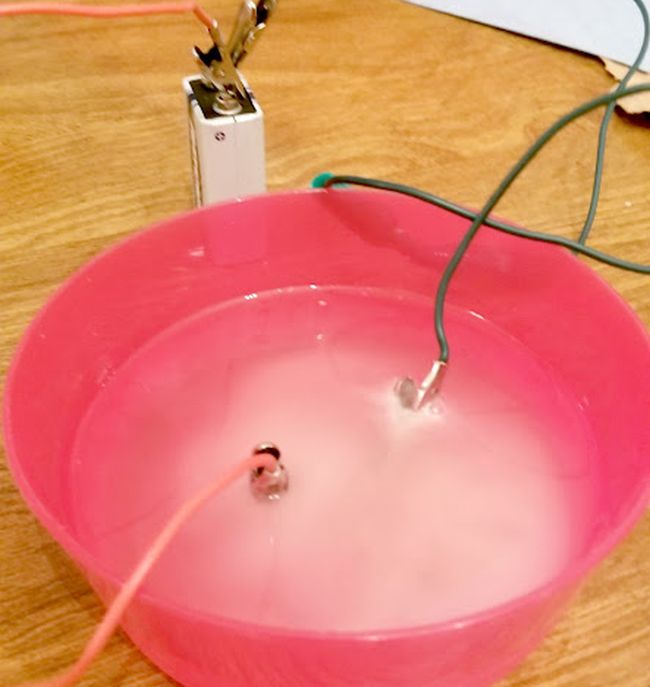
Break the covalent bond of H 2 O into H and O with this simple experiment. You only need simple supplies for this one. Turn it into a science fair project by changing up the variables—does the temperature of the water matter? What happens if you try this with other liquids?
Learn more: Covalent Bonds at Teaching Without Chairs
Measure the calories in various foods
Are the calorie counts on your favorite snacks accurate? Build your own calorimeter and find out! This kit from Home Science Tools has all the supplies you’ll need.
Detect latent fingerprints
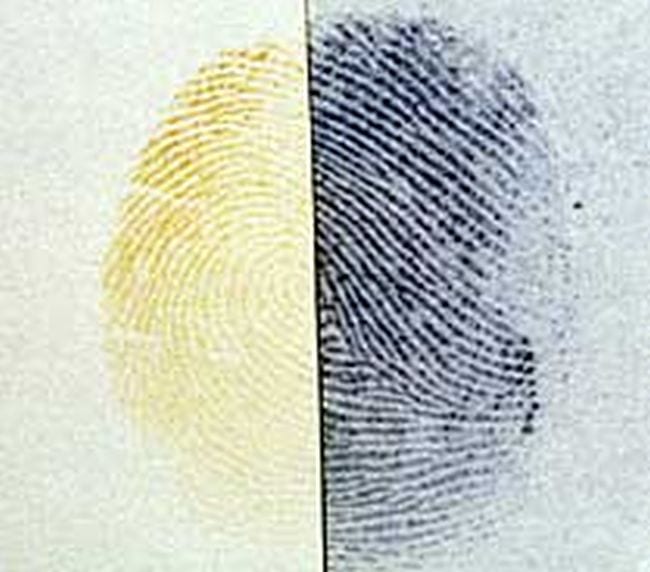
Forensic science is engrossing and can lead to important career opportunities too. Explore the chemistry needed to detect latent (invisible) fingerprints, just like they do for crime scenes!
Learn more: Fingerprints Project at Hub Pages
Use Alka-Seltzer to explore reaction rate
Difficulty: Easy / Materials: Easy
Tweak this basic concept to create a variety of high school chemistry science fair projects. Change the temperature, surface area, pressure, and more to see how reaction rates change.
Determine whether sports drinks provide more electrolytes than OJ
Are those pricey sports drinks really worth it? Try this experiment to find out. You’ll need some special equipment for this one; buy a complete kit at Home Science Tools .
Turn flames into a rainbow
You’ll need to get your hands on a few different chemicals for this experiment, but the wow factor will make it worth the effort! Make it a science project by seeing if different materials, air temperature, or other factors change the results.
Discover the size of a mole
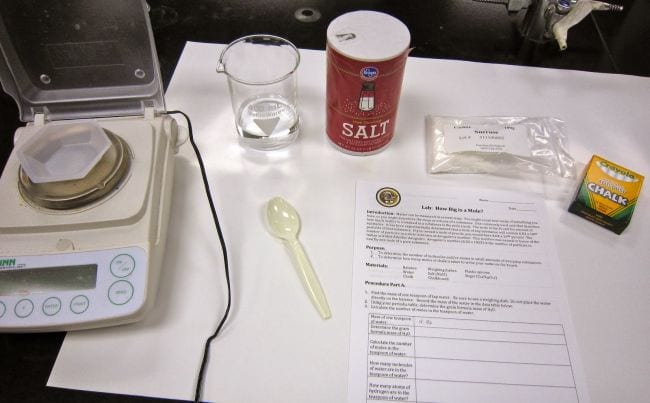
The mole is a key concept in chemistry, so it’s important to ensure students really understand it. This experiment uses simple materials like salt and chalk to make an abstract concept more concrete. Make it a project by applying the same procedure to a variety of substances, or determining whether outside variables have an effect on the results.
Learn more: How Big Is a Mole? at Amy Brown Science
Cook up candy to learn mole and molecule calculations
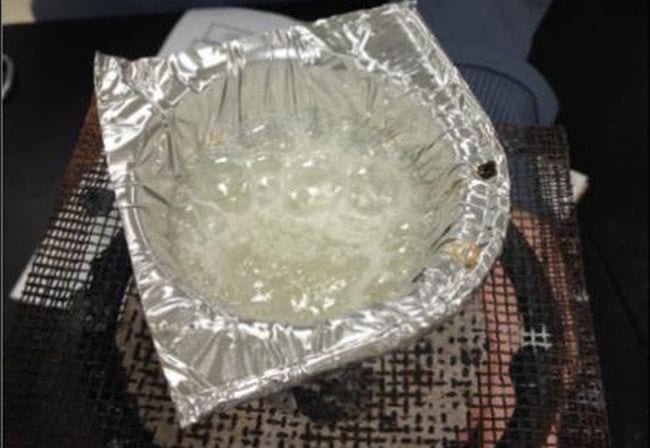
This edible experiment lets students make their own peppermint hard candy while they calculate mass, moles, molecules, and formula weights. Tweak the formulas to create different types of candy and make this into a sweet science fair project!
Learn more: Candy Chemistry at Dunigan Science on TpT
Make soap to understand saponification

Take a closer look at an everyday item: soap! Use oils and other ingredients to make your own soap, learning about esters and saponification. Tinker with the formula to find one that fits a particular set of parameters.
Learn more: Saponification at Chemistry Solutions on TpT
Uncover the secrets of evaporation
Explore the factors that affect evaporation, then come up with ways to slow them down or speed them up for a simple science fair project.
Learn more: Evaporation at Science Projects
More Chemistry Science Fair Projects for High School
These questions and ideas can spark ideas for a unique experiment:
- Compare the properties of sugar and artificial sweeteners.
- Explore the impact of temperature, concentration, and seeding on crystal growth.
- Test various antacids on the market to find the most effective product.
- What is the optimum temperature for yeast production when baking bread from scratch?
- Compare the vitamin C content of various fruits and vegetables.
- How does temperature affect enzyme-catalyzed reactions?
- Investigate the effects of pH on an acid-base chemical reaction.
- Devise a new natural way to test pH levels (such as cabbage leaves).
- What’s the best way to slow down metal oxidation (the form of rust)?
- How do changes in ingredients and method affect the results of a baking recipe?
When you think of physics science projects for high school, the first thing that comes to mind is probably the classic build-a-bridge. But there are plenty of other ways for teens to get hands-on with physics concepts. Here are some to try.
Remove the air in a DIY vacuum chamber
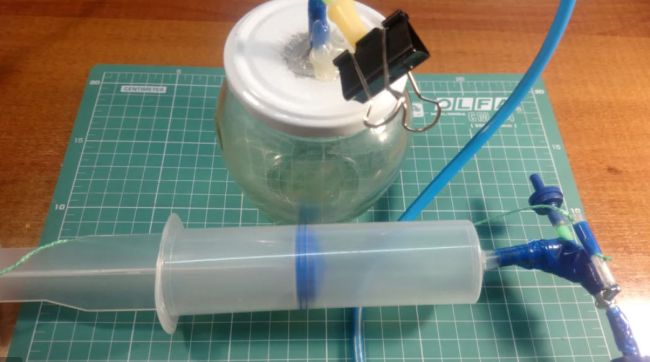
You can use a vacuum chamber to do lots of cool high school science fair projects, but a ready-made one can be expensive. Try this project to make your own with basic supplies.
Learn more: Vacuum Chamber at Instructables
Put together a mini Tesla coil
Looking for a simple but showy high school science fair project? Build your own mini Tesla coil and wow the crowd!
Boil water in a paper cup
Logic tells us we shouldn’t set a paper cup over a heat source, right? Yet it’s actually possible to boil water in a paper cup without burning the cup up! Learn about heat transfer and thermal conductivity with this experiment. Go deeper by trying other liquids like honey to see what happens.
Build a better light bulb
Emulate Edison and build your own simple light bulb. You can turn this into a science fair project by experimenting with different types of materials for filaments.
Measure the speed of light—with your microwave
Grab an egg and head to your microwave for this surprisingly simple experiment. By measuring the distance between cooked portions of egg whites, you’ll be able to calculate the wavelength of the microwaves in your oven and, in turn, the speed of light.
Generate a Lichtenberg figure
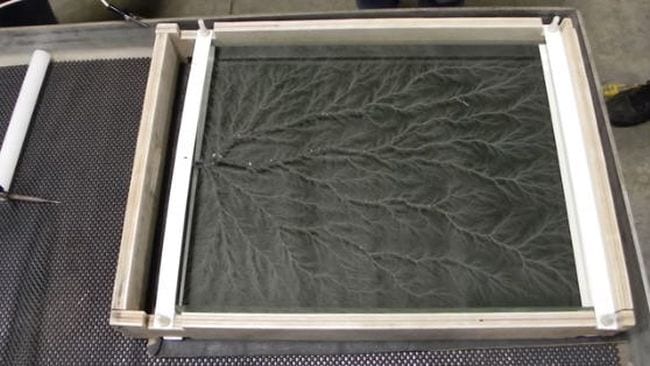
See electricity in action when you generate and capture a Lichtenberg figure with polyethylene sheets, wood, or even acrylic and toner. Change the electrical intensity and materials to see what types of patterns you can create.
Learn more: Lichtenberg Figure at Science Notes
Explore the power of friction with sticky note pads
Difficulty: Medium / Materials: Basic
Ever try to pull a piece of paper out of the middle of a big stack? It’s harder than you think it would be! That’s due to the power of friction. In this experiment, students interleave the sheets of two sticky note pads, then measure how much weight it takes to pull them apart. The results are astonishing!
Build a cloud chamber to prove background radiation
Ready to dip your toe into particle physics? Learn about background radiation and build a cloud chamber to prove the existence of muons.
Measure the effect of temperature on resistance
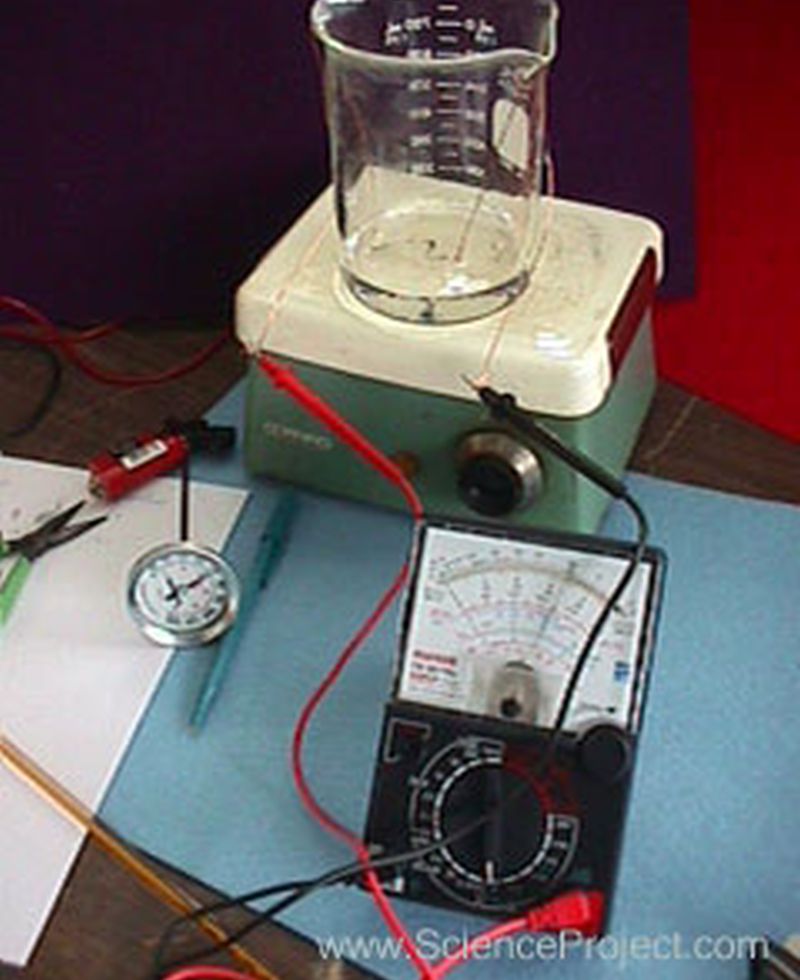
This is a popular and classic science fair experiment in physics. You’ll need a few specialized supplies, but they’re pretty easy to find.
Learn more: Temperature and Resistance at Science Project
Launch the best bottle rocket
A basic bottle rocket is pretty easy to build, but it opens the door to lots of different science fair projects. Design a powerful launcher, alter the rocket so it flies higher or farther, or use only recycled materials for your flyer.
More Physics Science Fair Projects for High School
Design your own experiment in response to these questions and prompts.
- Determine the most efficient solar panel design and placement.
- What’s the best way to eliminate friction between two objects?
- Explore the best methods of insulating an object against heat loss.
- What effect does temperature have on batteries when stored for long periods of time?
- Test the effects of magnets or electromagnetic fields on plants or other living organisms.
- Determine the best angle and speed of a bat swing in baseball.
- What’s the best way to soundproof an area or reduce noise produced by an item?
- Explore methods for reducing air resistance in automotive design.
- Use the concepts of torque and rotation to perfect a golf swing.
- Compare the strength and durability of various building materials.
Many schools are changing up their science fairs to STEM fairs, to encourage students with an interest in engineering to participate. Many great engineering science fair projects start with a STEM challenge, like those shown here. Use these ideas to spark a full-blown project to build something new and amazing!
Solve a current environmental issue
A science fair project can also be an entry into the Slingshot Challenge . Students produce a 1-minute video with a solution to a current environmental problem (think: uniting creative waste reducers on social media or rehabilitating forests affected by fire) for the chance to receive up to $10,000 in funding.
Construct a model maglev train
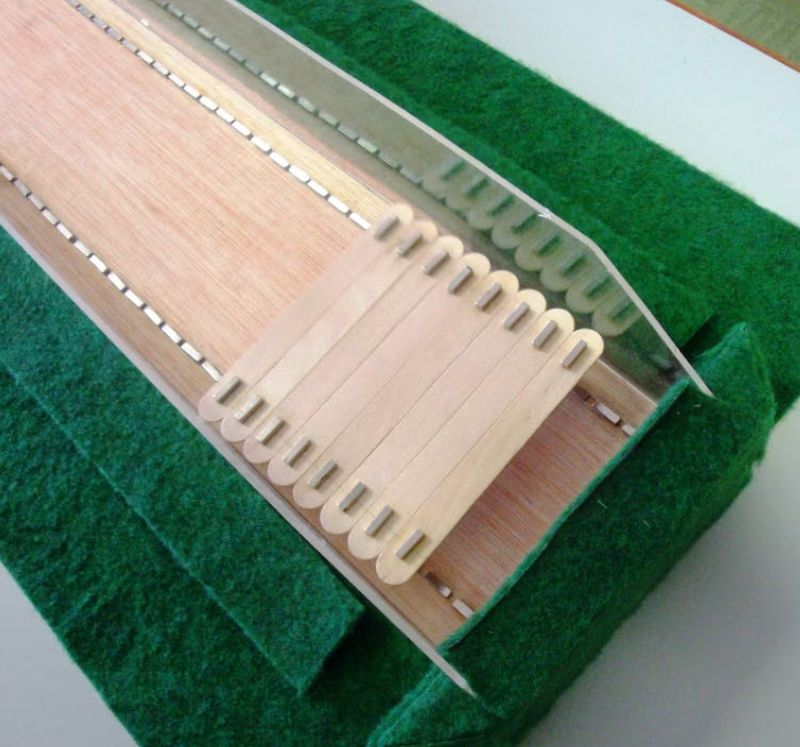
Maglev trains may just be the future of mass transportation. Build a model at home, and explore ways to implement the technology on a wider basis.
Learn more: Maglev Model Train at Supermagnete
Design a more efficient wind turbine
Wind energy is renewable, making it a good solution for the fossil fuel problem. For a smart science fair project, experiment to find the most efficient wind turbine design for a given situation.
Re-create Da Vinci’s flying machine

Da Vinci sketched several models of “flying machines” and hoped to soar through the sky. Do some research into his models and try to reconstruct one of your own.
Learn more: Da Vinci Flying Machine at Student Savvy
Design a heart-rate monitor
Smartwatches are ubiquitous these days, so pretty much anyone can wear a heart-rate monitor on their wrist. But do they work any better than one you can build yourself? Get the specialized items you need like the Arduino LilyPad Board on Amazon.
Race 3D printed cars
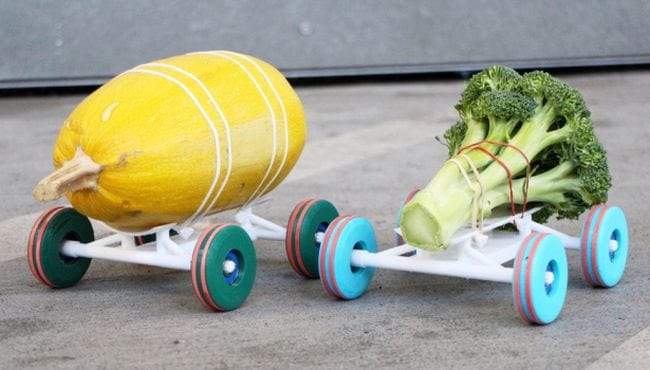
3D printers are a marvel of the modern era, and budding engineers should definitely learn to use them. Use Tinkercad or a similar program to design and print race cars that can support a defined weight, then see which can roll the fastest! (No 3D printer in your STEM lab? Check the local library. Many of them have 3D printers available for patrons to use.)
Learn more: 3D Printed Cars at Instructables
Grow veggies in a hydroponic garden
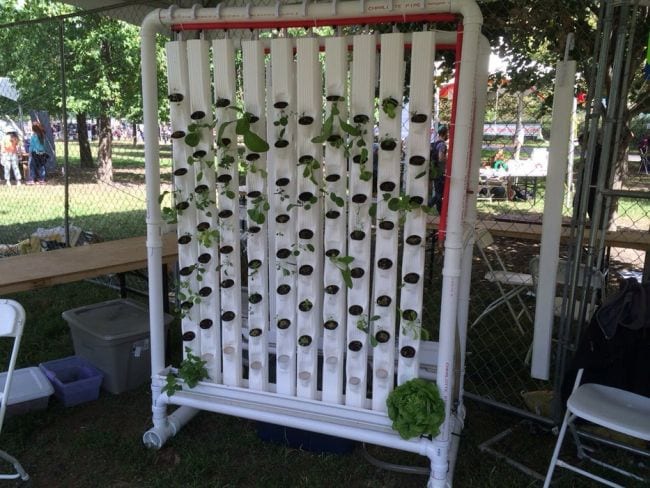
Hydroponics is the gardening wave of the future, making it easy to grow plants anywhere with minimal soil required. For a science fair STEM engineering challenge, design and construct your own hydroponic garden capable of growing vegetables to feed a family. This model is just one possible option.
Learn more: Hydroponics at Instructables
Grab items with a mechanical claw

Delve into robotics with this engineering project. This kit includes all the materials you need, with complete video instructions. Once you’ve built the basic structure, tinker around with the design to improve its strength, accuracy, or other traits.
Learn more: Hydraulic Claw at KiwiCo
Construct a crystal radio
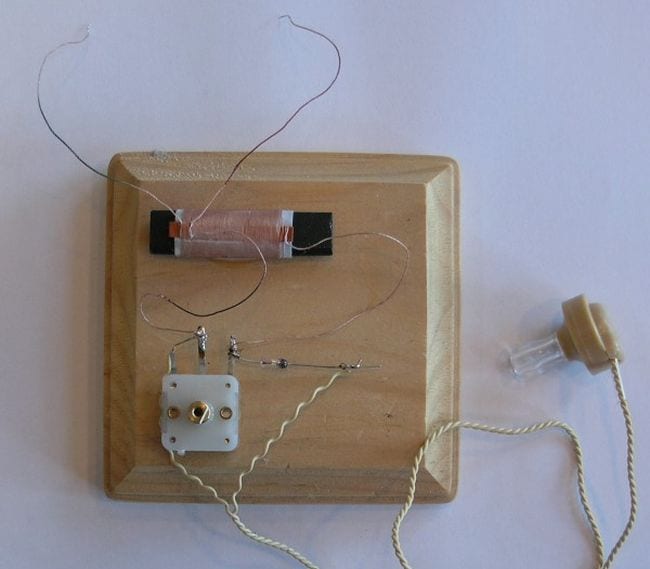
Return to the good old days and build a radio from scratch. This makes a cool science fair project if you experiment with different types of materials for the antenna. It takes some specialized equipment, but fortunately, Home Science Tools has an all-in-one kit for this project.
Learn more: Crystal Radio at Scitoys.com
Build a burglar alarm

The challenge? Set up a system to alert you when someone has broken into your house or classroom. This can take any form students can dream up, and you can customize this STEM high school science experiment for multiple skill levels. Keep it simple with an alarm that makes a sound that can be heard from a specified distance. Or kick it up a notch and require the alarm system to send a notification to a cell phone, like the project at the link.
Learn more: Intruder Alarm at Instructables
Walk across a plastic bottle bridge
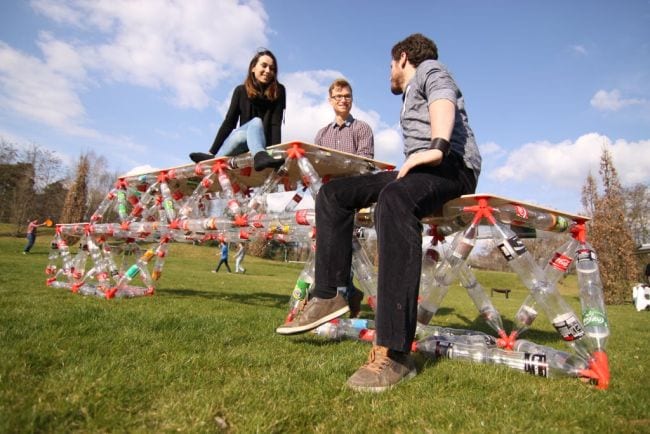
Balsa wood bridges are OK, but this plastic bottle bridge is really impressive! In fact, students can build all sorts of structures using the concept detailed at the link. It’s the ultimate upcycled STEM challenge!
Learn more: TrussFab Structures at Instructables
Looking for more science content? Check out the Best Science Websites for Middle and High School .
Plus, get all the latest teaching tips and tricks when you sign up for our newsletters .
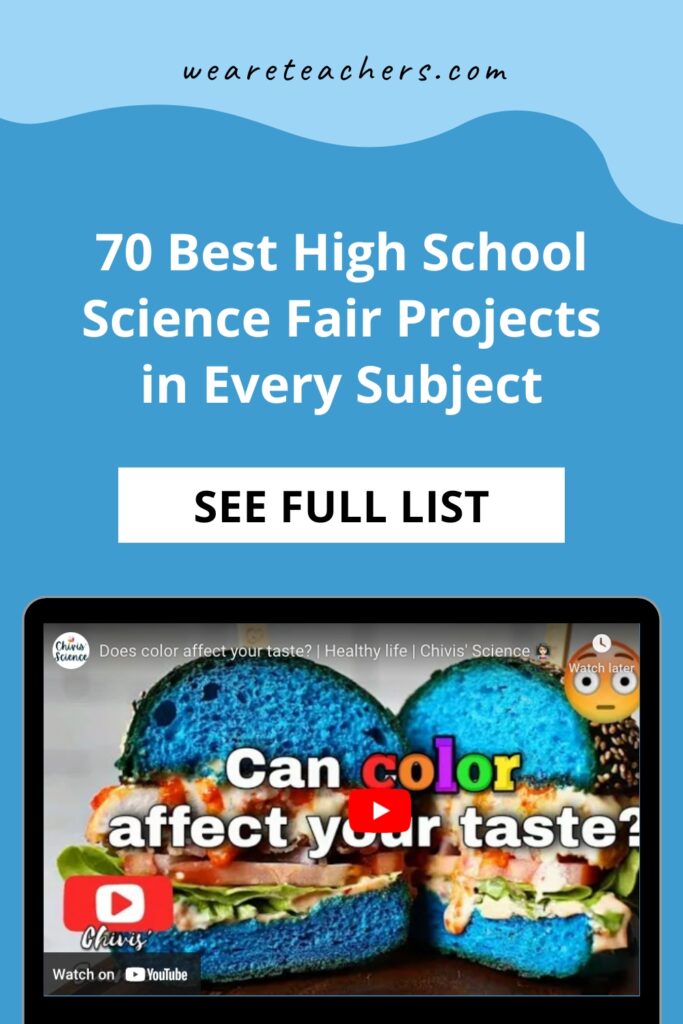
You Might Also Like
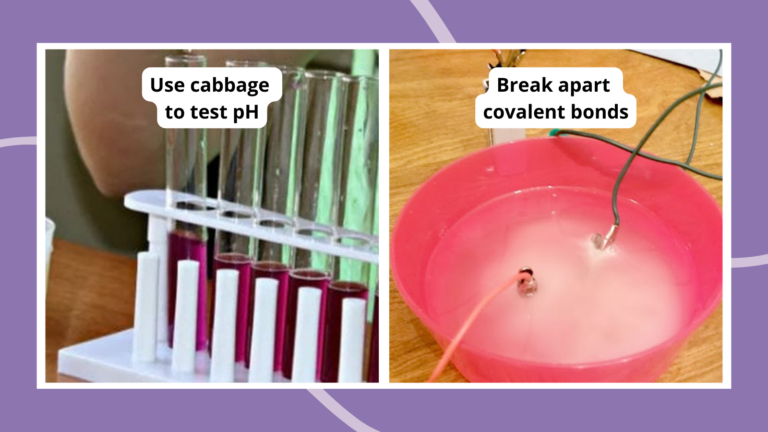
45 Cool Chemistry Experiments, Demos, and Science Fair Projects
Don't forget your safety equipment! Continue Reading
Copyright © 2024. All rights reserved. 5335 Gate Parkway, Jacksonville, FL 32256
A .gov website belongs to an official government organization in the United States.
A lock ( ) or https:// means you've safely connected to the .gov website. Share sensitive information only on official, secure websites.
- Public Health in STEM Education
- CDC's Impact
- Public Health Strategy
- Teacher Resources K-12
Student Resources K–12
- College and Professional Resources
- Examples of STEM Partnerships
What to know
CDC's Comics, camps, and apps can help you explore public health. Help solve outbreaks like a disease detective. See how what you are learning in school can help create a healthier world.
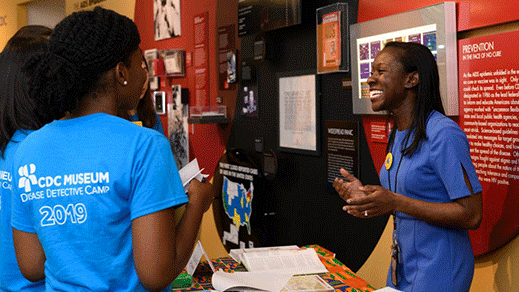
Elementary School
- Ask a Scientist Comic Series
- CDC Museum The Story of CDC Enrichment Modules
- BAM! Dining Decisions App
- See all resources
Middle and High School
Cdc museum disease detective camp.
- NCHS Data Detectives Camp
- Public Health Academy Teen Newsletter
- Junior Disease Detectives: Operation Outbreak Graphic Novel
Learn more about the CDC Museum Disease Detective Camp
Fun fact: Attend CDC Museum Disease Detective Camp as a high school student. Then, apply to become a camp counselor the next year. After becoming a counselor, apply to become the camp intern the following year!
Impact: Since 2005, over 1,950 rising high school juniors and seniors have attended camp. Students come from across the world to be immersed in this one-week CDC experience. 900 more students participated in the CDC Museum Public Health Academy Online Summer Course .
CDC Disease Detective Camp gives high school juniors and seniors exposure to key aspects of CDC.
CDC Museum Camp featured on CNN
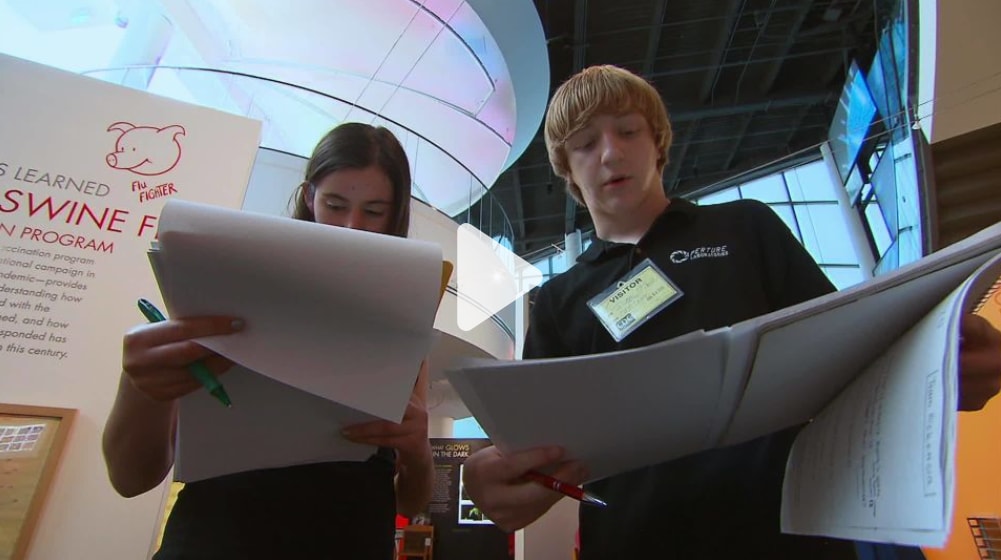
A group of teens learn how to become disease detectives at the CDC. Learn more about CDC's Camp . Source: CNN.
Science, Technology, Engineering, and Math (STEM)
Public Health in STEM Education is a program that aims to integrate public health concepts and practices into STEM (Science, Technology, Engineering, and Math) education.
For Everyone
Public health.

How to Get Started on Your First Psychology Experiment
Acquiring even a little expertise in advance makes science research easier..
Updated May 16, 2024 | Reviewed by Ray Parker
- Why Education Is Important
- Find a Child Therapist
- Students often struggle at the beginning of research projects—knowing how to begin.
- Research projects can sometimes be inspired by everyday life or personal concerns.
- Becoming something of an "expert" on a topic in advance makes designing a study go more smoothly.

One of the most rewarding and frustrating parts of my long career as a psychology professor at a small liberal arts college has been guiding students through the senior capstone research experience required near the end of their college years. Each psychology major must conduct an independent experiment in which they collect data to test a hypothesis, analyze the data, write a research paper, and present their results at a college poster session or at a professional conference.
The rewarding part of the process is clear: The students' pride at seeing their poster on display and maybe even getting their name on an article in a professional journal allows us professors to get a glimpse of students being happy and excited—for a change. I also derive great satisfaction from watching a student discover that he or she has an aptitude for research and perhaps start shifting their career plans accordingly.
The frustrating part comes at the beginning of the research process when students are attempting to find a topic to work on. There is a lot of floundering around as students get stuck by doing something that seems to make sense: They begin by trying to “think up a study.”
The problem is that even if the student's research interest is driven by some very personal topic that is deeply relevant to their own life, they simply do not yet know enough to know where to begin. They do not know what has already been done by others, nor do they know how researchers typically attack that topic.
Students also tend to think in terms of mission statements (I want to cure eating disorders) rather than in terms of research questions (Why are people of some ages or genders more susceptible to eating disorders than others?).
Needless to say, attempting to solve a serious, long-standing societal problem in a few weeks while conducting one’s first psychology experiment can be a showstopper.
Even a Little Bit of Expertise Can Go a Long Way
My usual approach to helping students get past this floundering stage is to tell them to try to avoid thinking up a study altogether. Instead, I tell them to conceive of their mission as becoming an “expert” on some topic that they find interesting. They begin by reading journal articles, writing summaries of these articles, and talking to me about them. As the student learns more about the topic, our conversations become more sophisticated and interesting. Researchable questions begin to emerge, and soon, the student is ready to start writing a literature review that will sharpen the focus of their research question.
In short, even a little bit of expertise on a subject makes it infinitely easier to craft an experiment on that topic because the research done by others provides a framework into which the student can fit his or her own work.
This was a lesson I learned early in my career when I was working on my own undergraduate capstone experience. Faced with the necessity of coming up with a research topic and lacking any urgent personal issues that I was trying to resolve, I fell back on what little psychological expertise I had already accumulated.
In a previous psychology course, I had written a literature review on why some information fails to move from short-term memory into long-term memory. The journal articles that I had read for this paper relied primarily on laboratory studies with mice, and the debate that was going on between researchers who had produced different results in their labs revolved around subtle differences in the way that mice were released into the experimental apparatus in the studies.
Because I already had done some homework on this, I had a ready-made research question available: What if the experimental task was set up so that the researcher had no influence on how the mouse entered the apparatus at all? I was able to design a simple animal memory experiment that fit very nicely into the psychological literature that was already out there, and this prevented a lot of angst.
Please note that my undergraduate research project was guided by the “expertise” that I had already acquired rather than by a burning desire to solve some sort of personal or social problem. I guarantee that I had not been walking around as an undergraduate student worrying about why mice forget things, but I was nonetheless able to complete a fun and interesting study.

My first experiment may not have changed the world, but it successfully launched my research career, and I fondly remember it as I work with my students 50 years later.

Frank McAndrew, Ph.D., is the Cornelia H. Dudley Professor of Psychology at Knox College.
- Find a Therapist
- Find a Treatment Center
- Find a Psychiatrist
- Find a Support Group
- Find Online Therapy
- International
- New Zealand
- South Africa
- Switzerland
- Asperger's
- Bipolar Disorder
- Chronic Pain
- Eating Disorders
- Passive Aggression
- Personality
- Goal Setting
- Positive Psychology
- Stopping Smoking
- Low Sexual Desire
- Relationships
- Child Development
- Self Tests NEW
- Therapy Center
- Diagnosis Dictionary
- Types of Therapy

At any moment, someone’s aggravating behavior or our own bad luck can set us off on an emotional spiral that threatens to derail our entire day. Here’s how we can face our triggers with less reactivity so that we can get on with our lives.
- Emotional Intelligence
- Gaslighting
- Affective Forecasting
- Neuroscience
- News & Media
- Chemical Biology
- Computational Biology
- Ecosystem Science
- Cancer Biology
- Exposure Science & Pathogen Biology
- Metabolic Inflammatory Diseases
- Advanced Metabolomics
- Mass Spectrometry-Based Measurement Technologies
- Spatial and Single-Cell Proteomics
- Structural Biology
- Biofuels & Bioproducts
- Human Microbiome
- Soil Microbiome
- Synthetic Biology
- Computational Chemistry
- Chemical Separations
- Chemical Physics
- Atmospheric Aerosols
- Human-Earth System Interactions
- Modeling Earth Systems
- Coastal Science
- Plant Science
- Subsurface Science
- Terrestrial Aquatics
- Materials in Extreme Environments
- Precision Materials by Design
- Science of Interfaces
- Friction Stir Welding & Processing
- Dark Matter
- Flavor Physics
- Fusion Energy Science
- Neutrino Physics
- Quantum Information Sciences
- Emergency Response
- AGM Program
- Tools and Capabilities
- Grid Architecture
- Grid Cybersecurity
- Grid Energy Storage
- Earth System Modeling
- Energy System Modeling
- Transmission
- Distribution
- Appliance and Equipment Standards
- Building Energy Codes
- Advanced Building Controls
- Advanced Lighting
- Building-Grid Integration
- Building and Grid Modeling
- Commercial Buildings
- Federal Performance Optimization
- Resilience and Security
- Grid Resilience and Decarbonization
- Building America Solution Center
- Energy Efficient Technology Integration
- Home Energy Score
- Electrochemical Energy Storage
- Flexible Loads and Generation
- Grid Integration, Controls, and Architecture
- Regulation, Policy, and Valuation
- Science Supporting Energy Storage
- Chemical Energy Storage
- Waste Processing
- Radiation Measurement
- Environmental Remediation
- Subsurface Energy Systems
- Carbon Capture
- Carbon Storage
- Carbon Utilization
- Advanced Hydrocarbon Conversion
- Fuel Cycle Research
- Advanced Reactors
- Reactor Operations
- Reactor Licensing
- Solar Energy
- Wind Resource Characterization
- Wildlife and Wind
- Community Values and Ocean Co-Use
- Wind Systems Integration
- Wind Data Management
- Distributed Wind
- Energy Equity & Health
- Environmental Monitoring for Marine Energy
- Marine Biofouling and Corrosion
- Marine Energy Resource Characterization
- Testing for Marine Energy
- The Blue Economy
- Environmental Performance of Hydropower
- Hydropower Cybersecurity and Digitalization
- Hydropower and the Electric Grid
- Materials Science for Hydropower
- Pumped Storage Hydropower
- Water + Hydropower Planning
- Grid Integration of Renewable Energy
- Geothermal Energy
- Algal Biofuels
- Aviation Biofuels
- Waste-to-Energy and Products
- Hydrogen & Fuel Cells
- Emission Control
- Energy-Efficient Mobility Systems
- Lightweight Materials
- Vehicle Electrification
- Vehicle Grid Integration
- Contraband Detection
- Pathogen Science & Detection
- Explosives Detection
- Threat-Agnostic Biodefense
- Discovery and Insight
- Proactive Defense
- Trusted Systems
- Nuclear Material Science
- Radiological & Nuclear Detection
- Nuclear Forensics
- Ultra-Sensitive Nuclear Measurements
- Nuclear Explosion Monitoring
- Global Nuclear & Radiological Security
- Disaster Recovery
- Global Collaborations
- Legislative and Regulatory Analysis
- Technical Training
- Additive Manufacturing
- Deployed Technologies
- Rapid Prototyping
- Systems Engineering
- 5G Security
- RF Signal Detection & Exploitation
- Climate Security
- Internet of Things
- Maritime Security
- Artificial Intelligence
- Graph and Data Analytics
- Software Engineering
- Computational Mathematics & Statistics
- High-Performance Computing
- Visual Analytics
- Lab Objectives
- Publications & Reports
- Featured Research
- Diversity, Equity, Inclusion & Accessibility
- Lab Leadership
- Lab Fellows
- Staff Accomplishments
- Undergraduate Students
- Graduate Students
- Post-graduate Students
- University Faculty
- University Partnerships
- K-12 Educators and Students
- STEM Workforce Development
- STEM Outreach
- Meet the Team
- Internships
- Regional Impact
- Philanthropy
- Volunteering
- Available Technologies
- Industry Partnerships
- Licensing & Technology Transfer
- Entrepreneurial Leave
- Atmospheric Radiation Measurement User Facility
- Electricity Infrastructure Operations Center
- Energy Sciences Center
- Environmental Molecular Sciences Laboratory
- Grid Storage Launchpad
- Institute for Integrated Catalysis
- Interdiction Technology and Integration Laboratory
- PNNL Portland Research Center
- PNNL Seattle Research Center
- PNNL-Sequim (Marine and Coastal Research)
- Radiochemical Processing Laboratory
- Shallow Underground Laboratory
Inspiring Students at the National Science Bowl
Nell Byler and Elise Bishoff shared their computer vision expertise
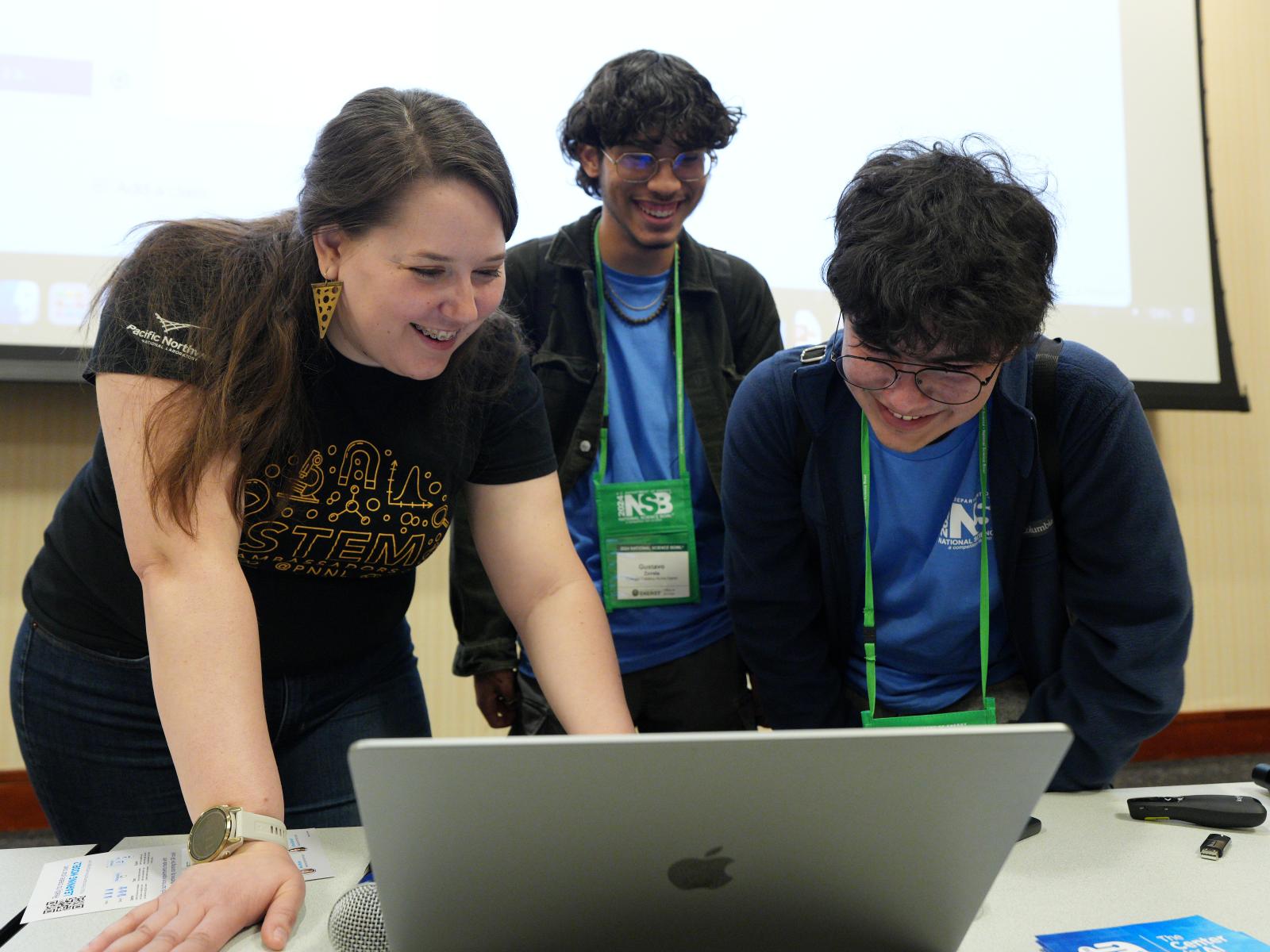
Data scientist Elise Bishoff (left) shows two high school students how to create their own artificial intelligence learning model.
(Image courtesy of the Department of Energy National Science Bowl)
What’s the difference between a dog and a muffin? While you may immediately be able to tell the difference between the two, computer vision models—a type of artificial intelligence (AI) —need to be trained first.
Students at this year’s National Science Bowl, hosted by the Department of Energy, were tasked to do just that. Pacific Northwest National Laboratory (PNNL) data scientists Eleanor (Nell) Byler and Elise Bishoff led some of the nation’s top high school students through a computer vision training experiment using Google’s Teachable Machine.
For Bishoff and Byler’s tutorial, students learned the basics of constructing a reliable and robust computer vision model. Then, they trained the model in real time and pinpointed ways the model could fail—setting the stage for students to build and train a more robust model themselves. Students had the choice between two tasks: training a model to differentiate between facial expressions or training a model to differentiate between body shapes.
“The students were really enthusiastic about this experiment—several of them told us they were excited to take what they learned and apply it to music, computers, and other tasks,” said Bishoff. “Many asked about PNNL’s internship programs to see how they could continue this work at the Lab.”
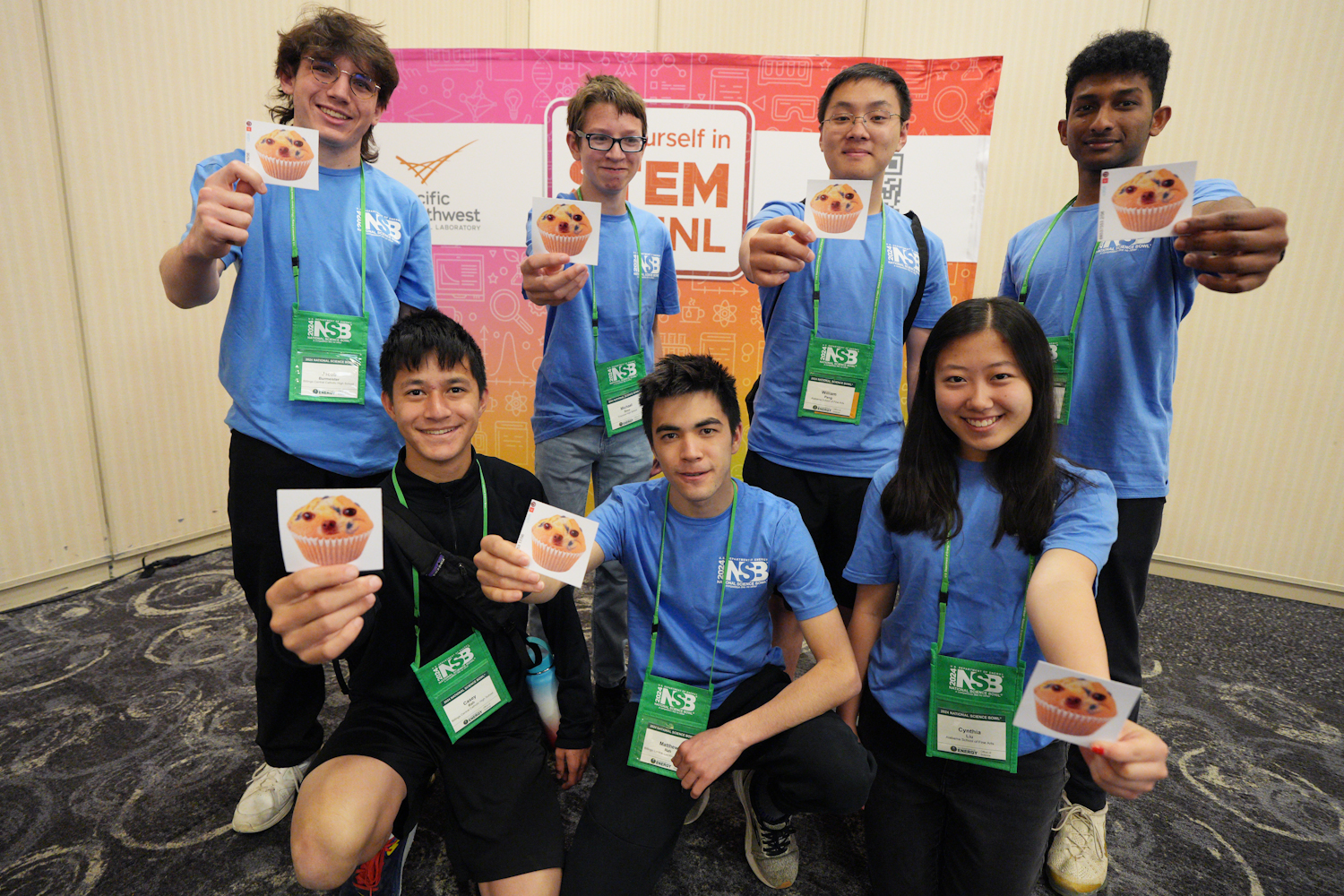
Byler and Bishoff both have a passion for teaching and mentoring the next generation of scientists. They both participate in PNNL’s STEM Ambassadors program to engage students in learning about PNNL’s AI research projects and STEM careers.
“There’s a depth and creativity to research carried out at PNNL,” said Byler. “Through the STEM Ambassadors program, we get to ignite a spark of excitement for research in others.”
Byler and Bishoff’s passion for outreach extends beyond PNNL. Byler led the University of Washington Mobile Planetarium program and co-founded Seattle's "Astronomy on Tap" event series. She has also been invited to speak at a variety of venues including the Seattle Museum of Pop Culture, the Olympic National Park, high school physics classes, and Girl Scouts science camps.
Likewise, Bishoff has led various machine learning reading groups, early career events, and recruiting efforts for Women in Data Science. Her work at PNNL afforded her the opportunity to teach data science across the globe, from local colleges to a workshop in Morocco.
Both Bishoff and Byler acknowledge the importance of role models and mentors in STEM.
“Mentorship is the most important factor in the long-term success of a scientist,” said Bishoff.
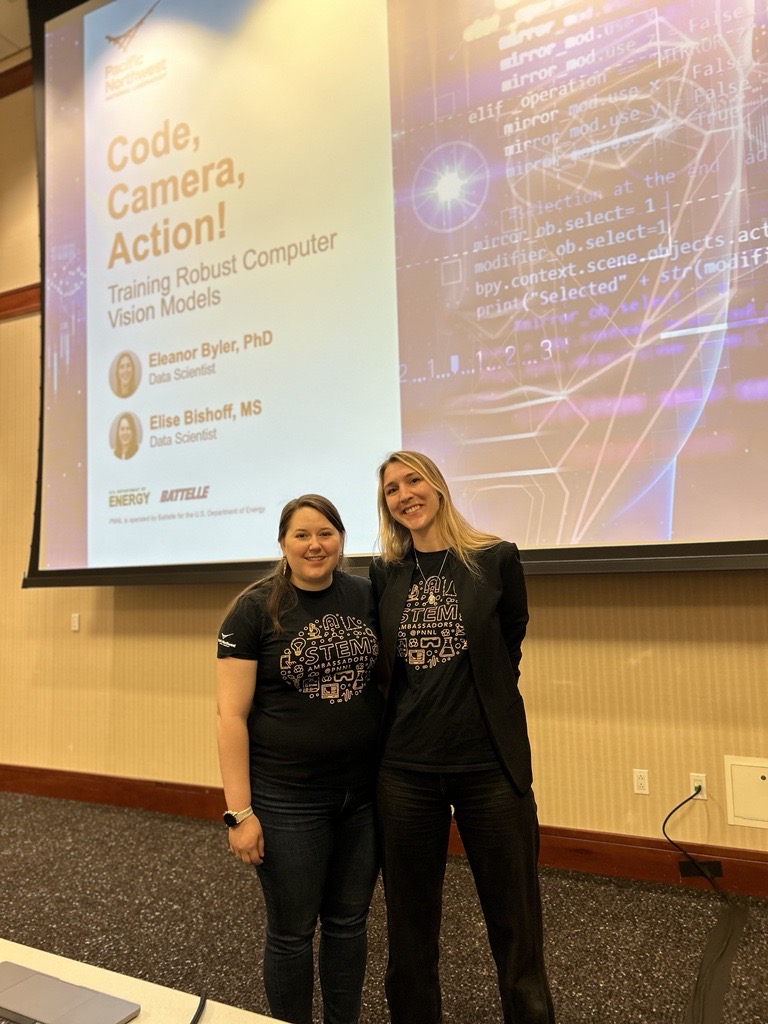
At PNNL, Byler leads several programs that leverage deep learning for satellite image applications, including volcanic plume quantification and chemical identification. Prior to coming to PNNL in 2020, Byler studied the origin and evolution of galaxies. Dr. Byler earned a BA in physics from Wellesley College and a PhD in astronomy from the University of Washington, Seattle. Dr. Byler was a National Science Foundation East Asia and Pacific Summer Institutes Fellow at the University of Tokyo's Kavli Institute for the Physics and Mathematics of the Universe and spent three years as a postdoctoral fellow at the Australian National University in Canberra, Australia.
Bishoff is a data scientist in the Applied AI Systems group at PNNL, where she currently supports transitioning data science research to deployable AI systems. Her work at PNNL has involved various data science topics such as the safety and security of machine learning models, natural language processing, record linkage on big data, model production, and robustness of computer vision models. Bishoff earned an MS in applied mathematics with an emphasis in data science from the University of Washington and a BS in mathematics with a minor in computer science from Seattle Pacific University.
Both Bishoff and Byler are members of the Center for AI @PNNL , which advances the frontiers of artificial intelligence to pioneer solutions that transform science, security, and energy.
Published: May 24, 2024
Research topics
Lab-level communications priority topics.
9 Undergraduate Research Projects That Wowed Us This Year
The telegraph. The polio vaccine. The bar code. Light beer. Throughout its history, NYU has been known for innovation, with faculty and alumni in every generation contributing to some of the most notable inventions and scientific breakthroughs of their time. But you don’t wind up in the history books—or peer-reviewed journals—by accident; academic research, like any specialized discipline, takes hard work and lots of practice.
And at NYU, for students who are interested, that training can start early—including during an undergraduate's first years on campus. Whether through assistantships in faculty labs, summer internships, senior capstones, or independent projects inspired by coursework, undergrad students have many opportunities to take what they’re learning in the classroom and apply it to create original scholarship throughout their time at NYU. Many present their work at research conferences, and some even co-author work with faculty and graduate students that leads to publication.
As 2023-2024 drew to a close, the NYU News team coordinated with the Office of the Provost to pull together a snapshot of the research efforts that students undertook during this school year. The nine featured here represent just a small fraction of the impressive work we encountered in fields ranging from biology, chemistry, and engineering to the social sciences, humanities, and the arts.
These projects were presented at NYU research conferences for undergrads, including Migration and Im/Mobility , Pathways for Discovery: Undergraduate Research and Writing Symposium , Social Impact: NYU’s Applied Undergraduate Research Conference , Arts-Based Undergraduate Research Conference , Gallatin Student Research Conference , Dreammaker’s Summit , Tandon’s Research Excellence Exhibit , and Global Engagement Symposium . Learn more about these undergrad research opportunities and others.
Jordan Janowski (CAS '24)
Sade Chaffatt (NYU Abu Dhabi '24)
Elsa Nyongesa (GPH, CAS ’24 )
Anthony Offiah (Gallatin ’26)
Kimberly Sinchi (Tandon ’24) and Sarah Moughal (Tandon ’25)
Rohan Bajaj (Stern '24)
Lizette Saucedo (Liberal Studies ’24)
Eva Fuentes (CAS '24)
Andrea Durham (Tandon ’26)
Jordan Janowski (CAS ’24) Major: Biochemistry Thesis title: “Engineering Chirality for Functionality in Crystalline DNA”
Jordan Janowski (CAS '24). Photo by Tracey Friedman
I work in the Structural DNA Nanotechnology Lab, which was founded by the late NYU professor Ned Seeman, who is known as the father of the field. My current projects are manipulating DNA sequences to self-assemble into high order structures.
Essentially, we’re using DNA as a building material, instead of just analyzing it for its biological functions. It constantly amazes me that this is possible.
I came in as a pre-med student, but when I started working in the lab I realized that I was really interested in continuing my research there. I co-wrote a paper with postdoc Dr. Simon Vecchioni who has been a mentor to me and helped me navigate applying to grad school. I’m headed to Scripps Research in the fall. This research experience has led me to explore some of the molecules that make up life and how they could be engineered into truly unnatural curiosities and technologies.
My PI, Prof. Yoel Ohayon , has been super supportive of my place on the NYU women’s basketball team, which I’m a member of. He’s been coming to my games since sophomore year, and he’ll text me with the score and “great game!”— it’s been so nice to have that support for my interests beyond the lab.
Anthony Offiah (Gallatin ’26) Concentration: Fashion design and business administration MLK Scholars research project title: “project: DREAMER”
Anthony Offiah (Gallatin '26). Photo by Tracey Friedman
In “project: DREAMER,” I explored how much a person’s sense of fashion is a result of their environment or societal pressures based on their identity. Certain groups are pressured or engineered to present a certain way, and I wanted to see how much of the opposing force—their character, their personality—affected their sense of style.
This was a summer research project through the MLK Scholars Program . I did ethnographic interviews with a few people, and asked them to co-design their ideal garments with me. They told me who they are, how they identify, and what they like in fashion, and we synthesized that into their dream garments. And then we had a photo shoot where they were empowered to make artistic choices.
Some people told me they had a hard time conveying their sense of style because they were apprehensive about being the center of attention or of being dissimilar to the people around them. So they chose to conform to protect themselves. And then others spoke about wanting to safeguard the artistic or vulnerable—or one person used the word “feminine”—side of them so they consciously didn’t dress how they ideally would.
We ended the interviews by stating an objective about how this co-designing process didn’t end with them just getting new clothes—it was about approaching fashion differently than how they started and unlearning how society might put them in a certain box without their approval.
My concentration in Gallatin is fashion design and business administration. In the industry some clothing is critiqued and some clothing is praised—and navigating that is challenging, because what you like might not be well received. So doing bespoke fashion for just one person is freeing in a sense because you don’t have to worry about all that extra stuff. It’s just the art. And I like being an artist first and thinking about the business second.
Lizette Saucedo (Global Liberal Studies ’24) Major: Politics, rights, and development Thesis title: “Acknowledging and Remembering Deceased Migrants Crossing the U.S.-Mexican Border”
Lizette Saucedo (Global Liberal Studies '24). Photo by Tracey Friedman
My thesis project is on commemorating migrants who are dying on their journey north to cross the U.S.–Mexican border. I look at it through different theoretical lenses, and one of the terms is necropolitics—how politics shapes the way the State governs life and especially death. And then of the main issues aside from the deaths is that a lot of people in the U.S. don’t know about them, due to the government trying to eschew responsibility for migrant suffering. In the final portion of the thesis, I argue for presenting what some researchers call “migrant artifacts”—the personal belongings left behind by people trying to cross over—to the public, so that people can become aware and have more of a human understanding of what’s going on.
This is my senior thesis for Liberal Studies, but the idea for it started in an International Human Rights course I took with professor Joyce Apsel . We read a book by Jason De León called The Land of the Open Graves , which I kept in the back of my mind. And then when I studied abroad in Germany during my junior year, I noticed all the different memorials and museums, and wondered why we didn’t have the equivalent in the U.S. My family comes from Mexico—my parents migrated—and ultimately all of these interests came together.
I came into NYU through the Liberal Studies program and I loved it. It’s transdisciplinary, which shaped how I view my studies. My major is politics, rights, and development and my minor is social work, but I’ve also studied museum studies, and I’ve always loved the arts. The experience of getting to work one-on-one on this thesis has really fortified my belief that I can combine all those things.
Sade Chaffatt (Abu Dhabi ’24) Major: Biology Thesis title: “The Polycomb repressive component, EED in mouse hepatocytes regulates liver homeostasis and survival following partial hepatectomy.”
Sade Chaffatt (NYU Abu Dhabi '24). Photo courtesy of NYUAD
Imagine your liver as a room. Within the liver there are epigenetic mechanisms that control gene expression. Imagine these epigenetic mechanisms as a dimmer switch, so that you could adjust the light in the room. If we remove a protein that is involved in regulating these mechanisms, there might be dysregulation—as though the light is too bright or too dim. One such protein, EED, plays a crucial role in regulating gene expression. And so my project focuses on investigating whether EED is required in mouse hepatocytes to regulate liver homeostasis and to regulate survival following surgical resection.
Stepping into the field of research is very intimidating when you’re an undergraduate student and know nothing. But my capstone mentor, Dr. Kirsten Sadler , encourages students to present their data at lab meetings and to speak with scientists. Even though this is nerve-wracking, it helps to promote your confidence in communicating science to others in the field.
If you’d asked 16-year-old me, I never would’ve imagined that I’d be doing research at this point. Representation matters a lot, and you often don't see women—especially not Black women—in research. Being at NYUAD has really allowed me to see more women in these spaces. Having had some experience in the medical field through internships, I can now say I’m more interested in research and hope to pursue a PhD in the future.
Kimberly Sinchi (Tandon ’24) Major: Computer Science Sarah Moughal (Tandon ’25) Major: Computer Science Project: Robotic Design Team's TITAN
Sarah Moughal (Tandon '25, left) and Kimberly Sinchi (Tandon '24). Photo by Tracey Friedman
Kimberly: The Robotic Design Team has been active at NYU for at least five years. We’re 60-plus undergrad and grad students majoring in electrical engineering, mechanical engineering, computer science, and integrated design. We’ve named our current project TITAN because of how huge it is. TITAN stands for “Tandon’s innovation in terraforming and autonomous navigation.”
Sarah: We compete in NASA’s lunatics competition every year, which means we build a robot from scratch to be able to compete in lunar excavation and construction. We make pretty much everything in house in the Tandon MakerSpace, and everyone gets a little experience with machining, even if you're not mechanical. A lot of it is about learning how to work with other people—communicating across majors and disciplines and learning how to explain our needs to someone who may not be as well versed in particular technologies as we are.
Kimberly: With NYU’s Vertically Integrated Project I’ve been able to take what I was interested in and actually have a real world impact with it. NASA takes notes on every Rover that enters this competition. What worked and what didn’t actually influences their designs for rovers they send to the moon and to Mars.
Eva Fuentes (CAS ’24) Major: Anthropology Thesis title: “Examining the relationship between pelvic shape and numbers of lumbar vertebrae in primates”
Eva Fuentes (CAS '24). Photo by Tracey Friedman
I came into NYU thinking I wanted to be an art history major with maybe an archeology minor. To do the archeology minor, you have to take the core classes in anthropology, and so I had to take an intro to human evolution course. I was like, this is the coolest thing I’ve learned—ever. So I emailed people in the department to see if I could get involved.
Since my sophomore year, I’ve been working in the Evolutionary Morphology Lab with Scott Williams, who is primarily interested in the vertebral column of primates in the fossil record because of how it can inform the evolution of posture and locomotion in humans.
For my senior thesis, I’m looking at the number of lumbar vertebrae—the vertebrae that are in the lower back specifically—and aspects of pelvic shape to see if it is possible to make inferences about the number of lumbar vertebrae a fossil may have had. The bones of the lower back are important because they tell us about posture and locomotion.
I committed to a PhD program at Washington University in St. Louis a few weeks ago to study biological anthropology. I never anticipated being super immersed in the academic world. I don’t come from an academic family. I had no idea what I was doing when I started, but Scott Williams, and everyone in the lab, is extremely welcoming and easy to talk to. It wasn't intimidating to come into this lab at all.
Elsa Nyongesa (GPH, CAS ’24 ) Major: Global Public Health and Biology Project: “Diversity in Breast Oncological Studies: Impacts on Black Women’s Health Outcomes”
Elsa Nyongesa (GPH, CAS '24). Photo by Tracey Friedman
I interned at Weill Cornell Medicine through their Travelers Summer Research Fellowship Program where I worked with my mentor, Dr. Lisa Newman, who is the head of the International Center for the Study of Breast Cancer Subtypes. I analyzed data on the frequency of different types of breast cancer across racial and ethnic groups in New York. At the same time, I was also working with Dr. Rachel Kowolsky to study minority underrepresentation in clinical research.
In an experiential learning course taught by Professor Joyce Moon Howard in the GPH department, I created a research question based on my internship experience. I thought about how I could combine my experiences from the program which led to my exploration of the correlation between minority underrepresentation in breast oncological studies, and how it affects the health outcomes of Black women with breast cancer.
In my major, we learn about the large scope of health disparities across different groups. This opportunity allowed me to learn more about these disparities in the context of breast cancer research. As a premedical student, this experience broadened my perspective on health. I learned more about the social, economic, and environmental factors influencing health outcomes. It also encouraged me to examine literature more critically to find gaps in knowledge and to think about potential solutions to health problems. Overall, this experience deepened my philosophy of service, emphasizing the importance of health equity and advocacy at the research and clinical level.
Rohan Bajaj (Stern ’24) Major: Finance and statistics Thesis title: “Measuring Socioeconomic Changes and Investor Attitude in Chicago’s Post-Covid Economic Recovery”
Rohan Bajaj (Stern '24). Photo by Tracey Friedman
My thesis is focused on understanding the effects of community-proposed infrastructure on both the socioeconomic demographics of cities and on fiscal health. I’m originally from Chicago, so it made a lot of sense to pay tribute back to the place that raised me. I’m compiling a list of characteristics of infrastructure that has been developed since 2021 as a part of the Chicago Recovery Plan and then assessing how neighborhoods have changed geographically and economically.
I’m looking at municipal bond yields in Chicago as a way of evaluating the fiscal health of the city. Turns out a lot of community-proposed infrastructure is focused in lower income areas within Chicago rather than higher income areas. So that makes the research question interesting, to see if there’s a correlation between the proposed and developed infrastructure projects, and if these neighborhoods are being gentrified alongside development.
I kind of stumbled into the impact investing industry accidentally from an internship I had during my time at NYU. I started working at a renewable energies brokerage in midtown, where my main job was collecting a lot of market research trends and delivering insights on how these different energy markets would come into play. I then worked with the New York State Insurance Fund, where I helped construct and execute their sustainable investment strategy from the ground up.
I also took a class called “Design with Climate Change” with Peter Anker in Gallatin during my junior year, and a lot of that class was focused on how to have climate resilient and publicly developed infrastructure, and understanding the effects it has on society. It made me start thinking about the vital role that physical surroundings play in steering communities.
In the short term I want to continue diving into impact-focused investing and help identify urban planners and city government to develop their communities responsibly and effectively.
Andrea Durham (Tandon, ’26) Major: Biomolecular science Research essay title: “The Rise and Fall of Aduhelm”
Andrea Durham (Tandon '26). Photo by Tracey Friedman
This is an essay I wrote last year in an advanced college essay writing class with Professor Lorraine Doran on the approval of a drug for Alzheimer’s disease called Aduhelm—a monoclonal antibody therapy developed by Biogen in 2021, which was described as being momentous and groundbreaking. But there were irregularities ranging from the design of its clinical trials to government involvement that led to the resignation of three scientists on an advisory panel, because not everybody in the scientific community agreed that it should be approved.
When I was six years old, my grandmother was diagnosed. Seeing the impact that it had over the years broke my heart and ignited a passion in me to pursue research.
When I started at NYU, I wasn’t really sure what I was going to do in the future, or what opportunities I would go after. This writing class really gave me an opportunity to reflect on the things that were important to me in my life. The September after I wrote this paper, I started volunteering in a lab at Mount Sinai for Alzheimer's disease research, and that’s what I’m doing now—working as a volunteer at the Center for Molecular Integrative Neuroresilience under Dr. Giulio Pasinetti. I have this opportunity to be at the forefront, and because of the work I did in my writing class I feel prepared going into these settings with an understanding of the importance of conducting ethical research and working with integrity.

IMAGES
VIDEO
COMMENTS
Here are some scientific research topics for high school students in earth science: 1. Studying the formation of earthquakes and their impact on landscapes. 2. Investigating the processes of erosion and sedimentation in rivers. 3. Analyzing the effects of climate change on glacial retreat. 4.
25+ Best Science Research Ideas for High School Students If you're an ambitious high school student looking for opportunities to build your college profile and learn new skills, consider undertaking a research project. You do not need to be sure about what you want to major in, but having a general idea aligned with your interests helps!
1. Investigate the applications of graph theory in analyzing social networks and online communities. Graph theory offers insights into complex network structures. You can apply it to understand the dynamics and connectivity of social networks, which is valuable for data analysis and internet technology. 2.
For example, last year over 4000 students applied for 500 spots in the Lumiere Research Scholar Program, a rigorous research program founded by Harvard researchers. The program pairs high-school students with Ph.D. mentors to work 1-on-1 on an independent research project .
2.1 Education 2.2 World history 2.3 Mental Health 2.4 Science 2.5 Music 2.6 Healthcare finance research topics 2.7 Environmental 2.8 Entrepreneurship 3 Conclusion Research papers are common assignments in high school systems worldwide.
110+ Best Scientific Research Topics for High School Students: Igniting Curiosity CourseMentor™ > Education > 110+ Best Scientific Research Topics for High School Students: Igniting Curiosity By admin September 25, 2023 Explore a wide range of scientific research topics for high school students.
In this project, we will perform and systematic review and meta-analysis of fasting or diet-induced autophagy and its benefits on the body. You will gain skills in 1) searching and reviewing primary literature, 2) computational skills for performing data analysis (R language), and 3) writing your scientific findings.
Science іѕ thе dіѕсірlіnе thаt іѕ ѕhіnіng lіkе a ѕtаr іn аll wаlkѕ оf life. High school students аrе generally gіvеn wrіtіng assignments іn Science. Chооѕіng topic on science and technology саn bе difficult bесаuѕе it соvеrѕ mаnу ѕресіаlіzеd аrеаѕ оf ѕtudу. Thеrе іѕ lіfе science, physical science, еаrth ѕсіеnсе ...
12 Introduction Hi! We are college students in CUSJ, the Columbia Undergraduate Science Journal. From high school, we became interested in trying out research and working to make scientific discoveries. We put together this high school guide to research with all of the information that we wish we had known when we started out in high school.
58 Good Research Paper Topics for High School Students June 27, 2023 We've all been there: you're sitting in English or Social Studies, and suddenly your teacher announces those dreaded words: "I'd like you all to pick a topic for your upcoming research paper." Your stomach lurches as your mind races to think of good research paper topics.
151 Good Research Topics For High School Students By Calltutors Team In this blog, we have discussed the research topics for high school students. Research papers allow high school students to explore academic subjects in-depth and learn how to find and analyze information.
Founded in 2003, Science News Explores is a free, award-winning online publication dedicated to providing age-appropriate science news to learners, parents and educators. The publication, as well as Science News magazine, are published by the Society for Science, a nonprofit 501(c)(3) membership organization dedicated to public engagement in scientific research and education.
1. Genetics and Heredity: Understanding Life's Blueprint Genetics and heredity are the foundation of life's diversity. High school students can explore how DNA acts as life's blueprint through simple experiments like DNA extraction from fruits or studying genetic traits and inheritance patterns.
150+ Life Science Research Topics for High School Students: From Cells to Ecosystems CourseMentor™ > Education > 150+ Life Science Research Topics for High School Students: From Cells to Ecosystems By admin September 26, 2023 Explore a wide range of life science research topics for high school students.
Topic 1: Artificial Intelligence (AI) AI stands at the forefront of technological innovation. Students can engage in research on AI applications in various sectors and the ethical implications of AI. This field is suitable for students with interests in computer science, AI, data analytics, and related areas. Topic 2: Applied Math and AI
Talking of medical science topics, a wealth of information is available to draw on. Whether it is a dissertation or high school science research papers topics. If you are a medical student struggling to find easy science research topics for your research project, the following list will help you. Science Research Paper Ideas
By Eric Eng 30 Physics Research Ideas for High School Students Physics research offers high school students a unique window into the mysteries of the universe, from the smallest particles to the vast expanses of space. If you're a student interested in research ideas that delve into physics, you're in the right place.
3. Regeneron International Science and Engineering Fair (ISEF) Grades: 9-12. Type: Local, Regional, and International. The Regeneron ISEF is the world's largest international pre-college science competition—more than 1,800 high school students, representing more than 75 countries, regions, and territories, take part.
For a personalized list of science projects, high schoolers can use the Science Buddies Topic Selection Wizard. The wizard asks students to respond to a series of simple statements and then uses their answers to recommend age-appropriate projects that fit their interests. Explore Our Science Videos Make a Self-Starting Siphon
80+ Science Research Paper Topics Ideas For Students Essay writing or writing dissertation is an integral part of education at any level, middle school, high school, or college. Some of the most common essays are on science research topics, and they are also quite interesting.
Feb 6, 2024 The cool thing about high school science fair projects is that kids are old enough to tackle some pretty amazing concepts. Some science experiments for high school are just advanced versions of simpler projects they did when they were younger, with detailed calculations or fewer instructions.
After becoming a counselor, apply to become the camp intern the following year! Impact: Since 2005, over 1,950 rising high school juniors and seniors have attended camp. Students come from across the world to be immersed in this one-week CDC experience. 900 more students participated in the CDC Museum Public Health Academy Online Summer Course.
1. , 2. ]. Participation in scientific conferences has been shown to increase high-school students' confidence in pursuing higher education in the future, with most high-school students reporting that the conference increased their interest in, and positive attitudes toward, science [. 1.
By Eric Eng 30 Chemistry Research Ideas for High School Students Exploring chemistry research ideas as a high school student opens doors to a world of discovery and innovation. Chemistry can spark a passion for science that lasts a lifetime.
Even a Little Bit of Expertise Can Go a Long Way. My usual approach to helping students get past this floundering stage is to tell them to avoid thinking up a study altogether. Instead, I tell ...
Students at this year's National Science Bowl, hosted by the Department of Energy, were tasked to do just that. Pacific Northwest National Laboratory (PNNL) data scientists Eleanor (Nell) Byler and Elise Bishoff led some of the nation's top high school students through a computer vision training experiment using Google's Teachable Machine.
Many present their work at research conferences, and some even co-author work with faculty and graduate students that leads to publication. As 2023-2024 drew to a close, the NYU News team coordinated with the Office of the Provost to pull together a snapshot of the research efforts that students undertook during this school year.